#meta dissertations.pdf
Text
uhhh thinkin about how mizu and taigen's relationship was described as "this meeting of the minds, this meeting of the swords, that they could not share with anybody else" in one of the netflix articles about the show
and i'm going crazy because YEAH they're both equally invested about swords and fighting in a way that nobody else in their lives are. and that's just. so important considering we're talking about mizu, who sees her sword as her own soul.
and it's not JUST mizu who's obsessed with fighting. taigen is too. cuz like after their duel at the shindo dojo, as taigen is examining his bald spot in the mirror where mizu cut off his hair, he literally interrupts his own turmoil over losing his honour, just to express his awe, openly admiring mizu's skill DESPITE the fact that mizu just beat his ass and stripped his honour and status from him

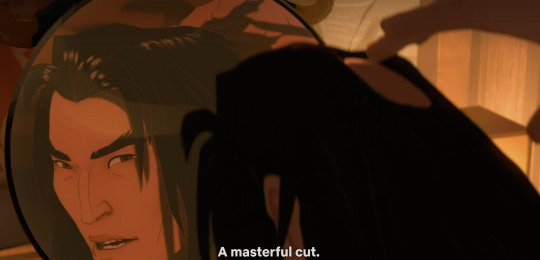
then in the next episode, mizu says a very similar line when she examines the cut flower that fowler had pinned to heiji shindo's robe.

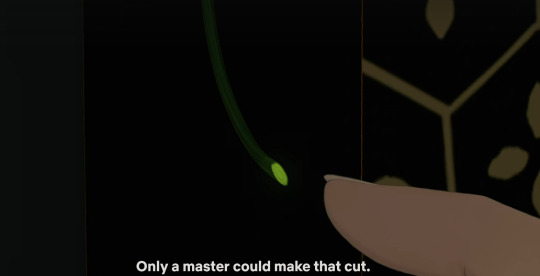
this was also such a sudden thing to notice in the middle of their conversation (my interpretation of this is that it hints to fowler's own skills with a blade, and gives mizu information about her enemy being a formidable opponent), but the fact that mizu had such a keen eye and managed to hone in on such a tiny detail from like a foot or two away is interesting because it shows us just how attentive mizu is, especially when it comes to blades and anything to do with them
to mizu (when she's not spiralling and agonising over her own self-hatred and the way the world treats her), swords are not a mere tool for revenge, but an art form which she is fascinated by and loves and admires. we see this from time to time, during rare moments of respite, like when she admires the duel in the beginning of ep4
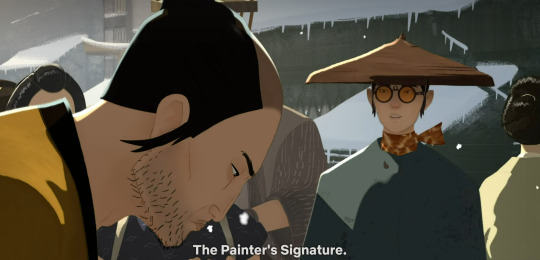
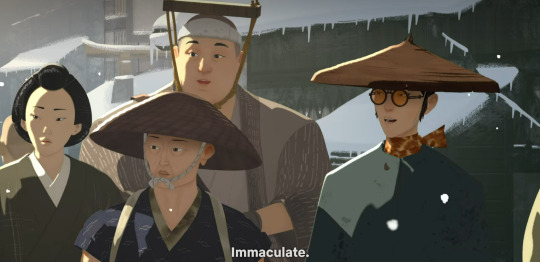
mizu also takes to heart all the teachings from her years training, while taigen is interestingly less strict about them, basically disregarding some of those teachings as mere pedantry, or even if he doesn't actually really think so, he at least tells mizu as much in his attempt to comfort her after her sword breaks

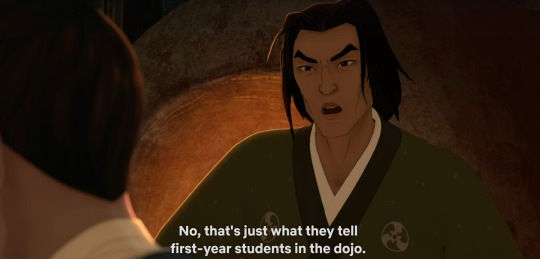
but that doesn't mean he doesn't care for the more formal aspects of his training at all. because in ep3 when he says this


this line about mount sumeru is not talking about the literal mountain in front of them, but is a recitation of a line from the lotus sutra, which is among the mahayana sutras that they learned as part of their spiritual training, as zen buddhism forms a lot of the basis for samurai doctrines and philosophy. the sutra given more emphasis in the show is the heart sutra that mizu writes on her body in ep7 during her rite of rebirth
so taigen saying this line, as i see it, is a way to bond with mizu, or at least make conversation over their shared knowledge, as we see him await a reaction as soon as he says this. but mizu gives him none, and he looks disappointed/annoyed/frustrated or what have you as he watches her walk off without a word
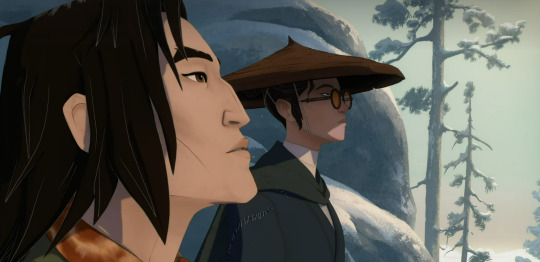
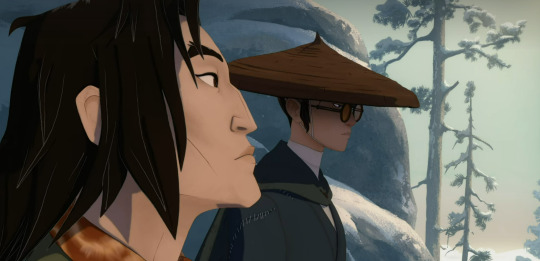

also we see a little more of their shared knowledge of swordsmanship in the last episode when it's clear that mizu has been training ringo in sword fighting techniques
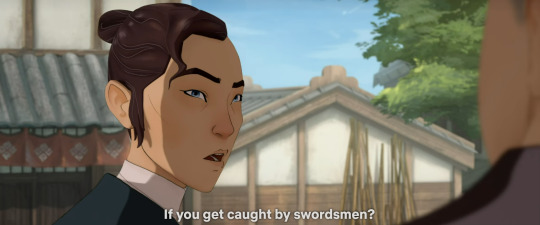
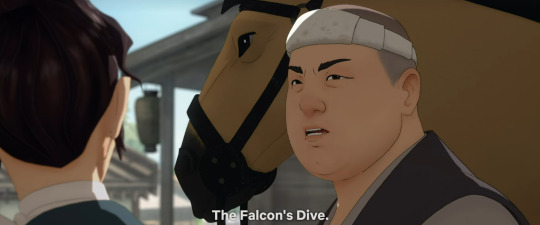
and later taigen recognises it instantly


they're both nerds about swords and fighting!!! they both respect each other's skills!!!


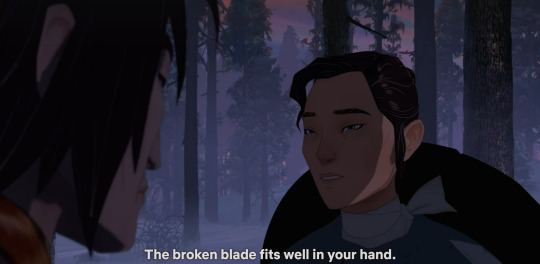
GOD i really hope in future episodes they get to bond some more over their shared passion and common training and just samurai camaraderie in general!!! mizu clearly loves the artistry of sword fighting so much, she deserves to have a confidant who shares that with her, someone she can talk openly about these things to!!!
because like remember when mikio was telling her about the naginata, she looked soooo uwu in love!!! admiring her husband as he showed off the weapon and told her the benefits of using it!!! believing at the time that she'd found a match who she could openly share her love of martial arts with!! she was having so much fun sparring him too. everyone says fighting is part of her love language and YES it IS!!!

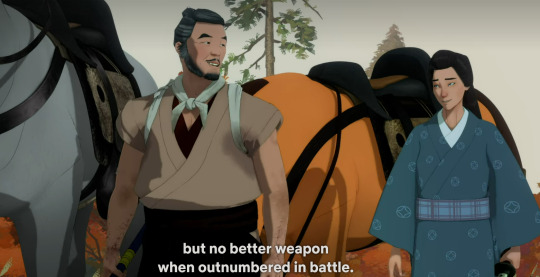
except the difference is that mikio—due to, among other things, their large age difference and subsequent gap in life experience—believes he is mizu's teacher, rather than her equal. this is the role he's readily taken throughout their marriage, from teaching her how to throw a knife to cut down fruit (not like she needed that particular lesson), to teaching her equestrian skills.
meanwhile taigen and mizu were both kids growing up poor in the same backwater fishing village, which means that they are and always have been PEERS. and this becomes even more pronounced once taigen is stripped of his giant ego and unlearns his prejudice, allowing them both to fully respect each other and view each other as equals

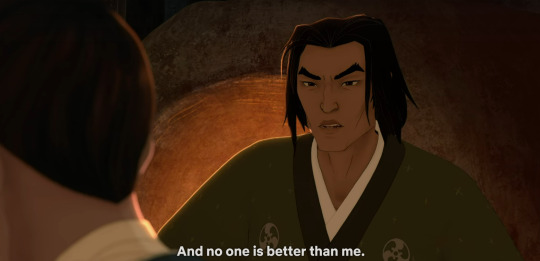
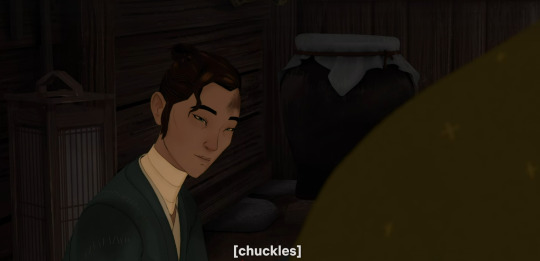
which is again why it frustrates taigen when mizu admits later in this scene that she basically doesn't care about saving the shogun. like he gets mad because it upends his initial belief in their shared goals and aligned values, believing them both to be samurai of equal standing and honour.
ALSO i'd like to add, that though mizu is the better swordsman as we see her win all their brawls and matches, she doesn't surpass him by that much, and mizu knows this.
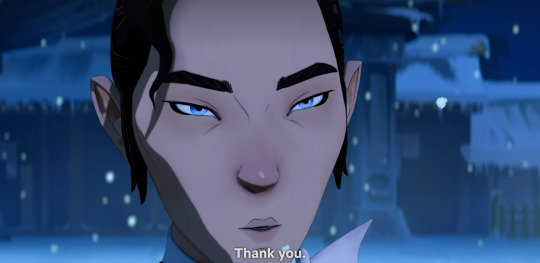
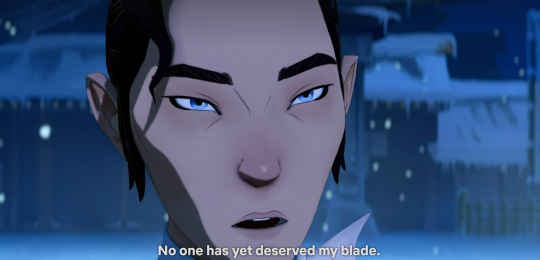
these words coming from mizu is such a huge compliment all things considered, acknowledging that he was strong enough to deserve fighting her, because shortly before this mizu was just about to say "no one has given me much of a challenge" only for taigen to enter the scene and, well, challenge her.
now combine this with her saying that chiaki's broken blade suits him well, giving to him HER sword which SHE made AND won, as a surety, promising him a duel that he "deserves". it's proof that even though she finds taigen an annoying brat and oftentimes an obstacle to her mission for revenge, she DOES respect him and does value his skills.
IN CONCLUSION nobody else is on their level, nobody else shares their love of swordsmanship and that is such an important factor to their bond and the way they relate to each other. i rest my case your honour
#mizu x taigen#taigen x mizu#taimizu#taizu#blue eye samurai#mizu blue eye samurai#taigen blue eye samurai#blue eye samurai meta#i caaaant stop thinking about THEM#like im soooo sorry im being annoying and cant shut up about these two#the brainrot is real yall. pray for me in these trying times#shut up haydar#meta dissertations.pdf#fandom.rtf
1K notes
·
View notes
Text
Very interesting to me that a certain subset of the BES fandom's favourite iterations of Mizu and Akemi are seemingly rooted in the facades they have projected towards the world, and are not accurate representations of their true selves.
And I see this is especially the case with Mizu, where fanon likes to paint her as this dominant, hyper-masculine, smirking Cool GuyTM who's going to give you her strap. And this idea of Mizu is often based on the image of her wearing her glasses, and optionally, with her cloak and big, wide-brimmed kasa.
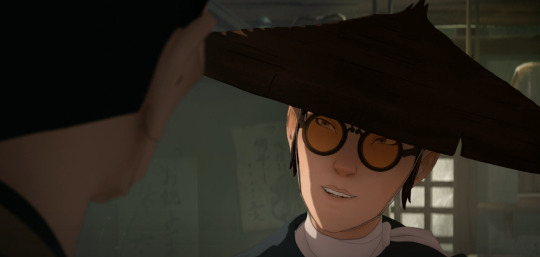

And what's interesting about this, to me, is that fanon is seemingly falling for her deliberate disguise. Because the glasses (with the optional combination of cloak and hat) represent Mizu's suppression of her true self. She is playing a role.

Take this scene of Mizu in the brothel in Episode 4 for example. Here, not only is Mizu wearing her glasses to symbolise the mask she is wearing, but she is purposely acting like some suave and cocky gentleman, intimidating, calm, in control. Her voice is even deeper than usual, like what we hear in her first scene while facing off with Hachiman the Flesh-Trader in Episode 1.
This act that Mizu puts on is an embodiment of masculine showboating, which is highly effective against weak and insecure men like Hachi, but also against women like those who tried to seduce her at the Shindo House.
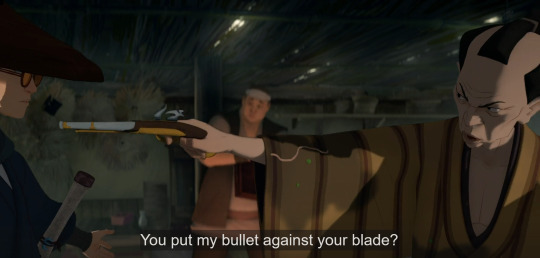

And that brings me to how Mizu's mask is actually a direct parallel to Akemi's mask in this very same scene.
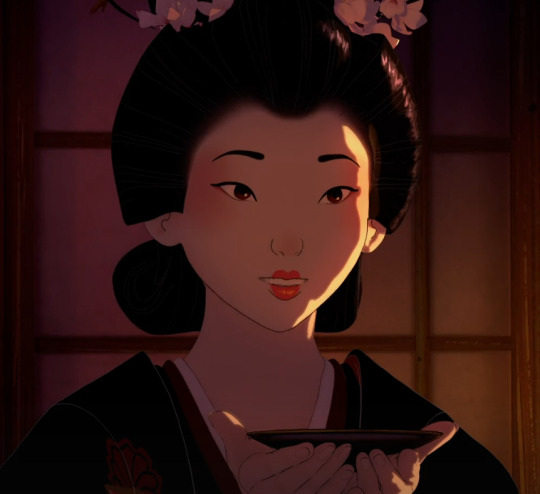
Here, Akemi is also putting up an act, playing up her naivety and demure girlishness, using her high-pitched lilted voice, complimenting Mizu and trying to make small talk, all so she can seduce and lure Mizu in to drink the drugged cup of sake.
So what I find so interesting and funny about this scene, characters within it, and the subsequent fandom interpretations of both, is that everyone seems to literally be falling for the mask that Mizu and Akemi are putting up to conceal their identities, guard themselves from the world, and get what they want.
It's also a little frustrating because the fanon seems to twist what actually makes Mizu and Akemi's dynamic so interesting by flattening it completely. Because both here and throughout the story, Mizu and Akemi's entire relationship and treatment of each other is solely built off of masks, assumptions, and misconceptions.
Akemi believes Mizu is a selfish, cocky male samurai who destroyed her ex-fiance's career and life, and who abandoned her to let her get dragged away by her father's guards and forcibly married off to a man she didn't know. on the other hand, Mizu believes Akemi is bratty, naive princess who constantly needs saving and who can't make her own decisions.
These misconceptions are even evident in the framing of their first impressions of each other, both of which unfold in these slow-motion POV shots.
Mizu's first impression of Akemi is that of a beautiful, untouchable princess in a cage. Swirling string music in the background.
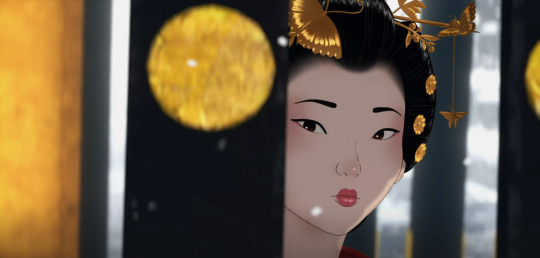
Akemi's first impression of Mizu is of a mysterious, stoic "demon" samurai who stole her fiance's scarf. Tense music and the sound of ocean waves in the background.

And then, going back to that scene of them together in Episode 4, both Mizu and Akemi continue to fool each other and hold these assumptions of each other, and they both feed into it, as both are purposely acting within the suppressive roles society binds them to in order to achieve their goals within the means they are allowed (Akemi playing the part of a subservient woman; Mizu playing the part of a dominant man).
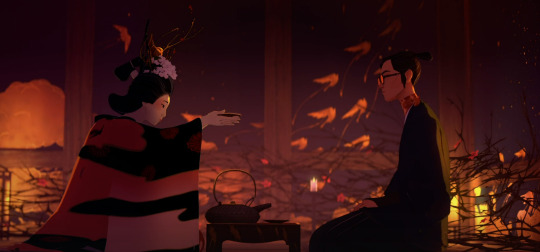
But then, for once in both their lives, neither of their usual tactics work.
Akemi is trying to use flattery and seduction on Mizu, but Mizu sees right through it, knowing that Akemi is just trying to manipulate and harm her. Rather than give in to Akemi's tactics, Mizu plays with Akemi's emotions by alluding to Taigen's death, before pinning her down, and then when she starts crying, Mizu just rolls her eyes and tells her to shut up.
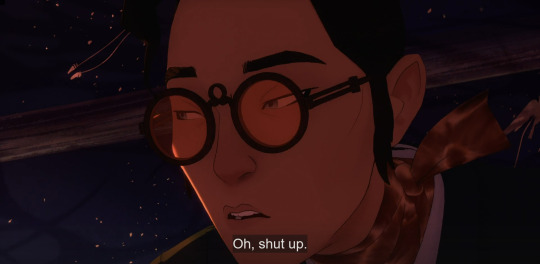
On the opposite end, when Mizu tries to use brute force and intimidation, Akemi also sees right through it, not falling for it, and instead says this:
"Under your mask, you're not the killer you pretend to be."
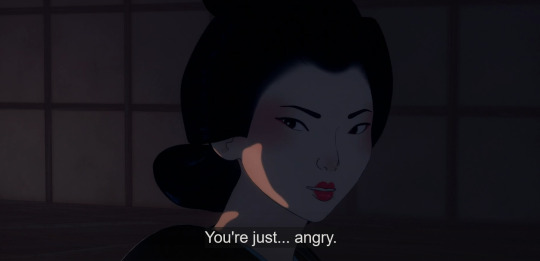
Nonetheless, despite the fact that they see a little bit through each other's masks, they both still hold their presumptions of each other until the very end of the season, with Akemi seeing Mizu as an obnoxious samurai swooping in to save the day, and Mizu seeing Akemi as a damsel in distress.
And what I find a bit irksome is that the fandom also resorts to flattening them to these tropes as well.
Because Mizu is not some cool, smooth-talking samurai with a big dick sword as Akemi (and the fandom) might believe. All of that is the facade she puts up and nothing more. In reality, Mizu is an angry, confused and lonely child, and a masterful artist, who is struggling against her own self-hatred. Master Eiji, her father figure who knows her best, knows this.
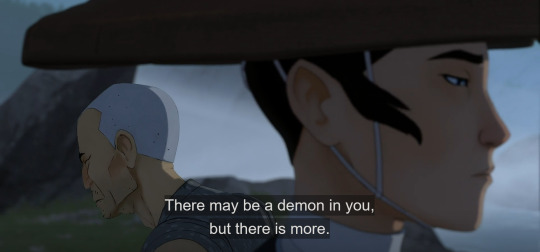
And Akemi, on the other hand, is not some girly, sweet, vain and spoiled princess as Mizu might believe. Instead she has never cared for frivolous things like fashion, love or looks, instead favouring poetry and strategy games instead, and has always only cared about her own independence. Seki, her father figure who knows her best, knows this.
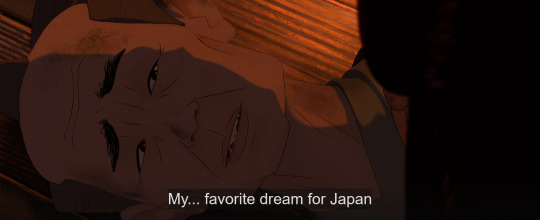

But neither is she some authoritative dominatrix, though this is part of her new persona that she is trying to project to get what she wants. Because while Akemi is willful, outspoken, intelligent and authoritative, she can still be naive! She is still often unsure and needs to have her hand held through things, as she is still learning and growing into her full potential. Her new parental/guardian figure, Madame Kaji, knows this as well.
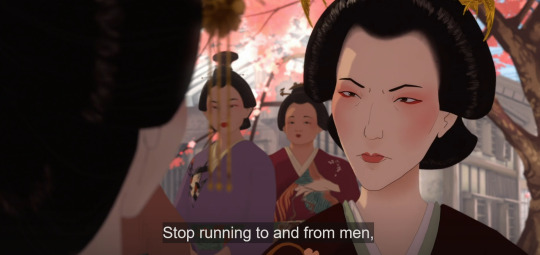
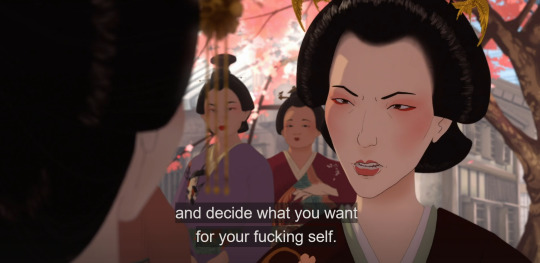
So with all that being said, now that we know that Mizu and Akemi are essentially wearing masks and putting up fronts throughout the show, what would a representation of Mizu's and Akemi's true selves actually look like? Easy. It's in their hair.
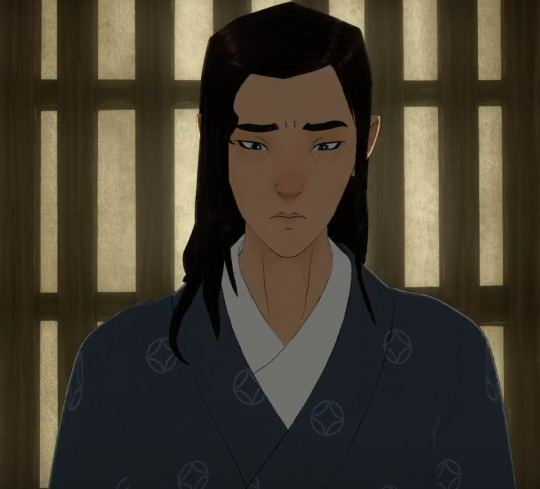

This shot on the left is the only time we see Mizu with her hair completely down. In this scene, she's being berated by Mama, and her guard is completely down, she has no weapon, and is no longer wearing any mask, as this is after she showed Mikio "all of herself" and tried to take off the mask of a subservient housewife. Thus, here, she is sad, vulnerable, and feeling small (emphasised further by the framing of the scene). This is a perfect encapsulation of what Mizu is on the inside, underneath all the layers of revenge-obsession and the walls she's put around herself.
In contrast, the only time we Akemi with her hair fully down, she is completely alone in the bath, and this scene takes place after being scorned by her father and left weeping at his feet. But despite all that, Akemi is headstrong, determined, taking the reigns of her life as she makes the choice to run away, but even that choice is reflective of her youthful naivety. She even gets scolded by Seki shortly after this in the next scene, because though she wants to be independent, she still hasn't completely learned to be. Not yet. Regardless, her decisiveness and moment of self-empowerment is emphasised by the framing of the scene, where her face takes up the majority of the shot, and she stares seriously into the middle distance.
To conclude, I wish popular fanon would stop mischaracterising these two, and flattening them into tropes and stereotypes (ie. masculine badass swordsman Mizu and feminine alluring queen but also girly swooning damsel Akemi), all of which just seems... reductive. It also irks me when Akemi is merely upheld as a love interest and romantic device for Mizu and nothing more, when she is literally Mizu's narrative foil (takes far more narrative precedence over romantic interest) and the deuteragonist of this show. She is her own person. That is literally the theme of her entire character and arc.
#blue eye samurai#mizu blue eye samurai#akemi blue eye samurai#blue eye samurai meta#just in case... im gonna tag this as#mizukemicritical#akemizucritical#though this post isnt actually criticising the ship itself but rather fanon's portrayal of the ship and the characters#for that reason lemme also tag this as#wank.mp3#feel free to disagree of course but please be civil#and if you need to rant about how wrong i am without any convincing evidence kindly feel free to make your own post. peace and love <3#fandom.rtf#meta dissertations.pdf#shut up haydar#edit: for full disclosure. i do rather dislike this ship. but obviously it's fine for anyone to enjoy it. please do! have your fun!#it's just that as usual! popular fanon and fandom around a ship is what has completely deterred me from any sense of enjoyment of it#it's a shame too because i was very open and even eager for some mizu/akemi romance in the future#but out-of-character fanon + the rudeness of certain fans has definitely soured it for me#but that doesn't mean people can't enjoy it obviously! ship and let ship!!!#plus it has its appeal which i DO STILL see and enjoy!!!!#i would even go as far as to call them soulmates because their narratives and characters are LITERALLY intertwined!!!#but. yeah. my gradual distaste for this ship is indeed very unfortunate.
664 notes
·
View notes
Text
yall i just KEEP doing back to mizu and taigen's wrestling scene in master eiji's forge and like i know that taigen literally got a boner from it BUT THE THING IS out of all the scenes these two have together, this scene actually has the least sexual tension ?!? cuz like the boner aside, this scene is actually very soft and emotions-driven rather than pure passion or lust.
arguably, a more passionate and sexually-charged scene would be their previous brawl in the snow with the chopsticks, which is tense and angry and also the scene that mizu thinks about when madame kaji talks about being honest with one's innermost desires.
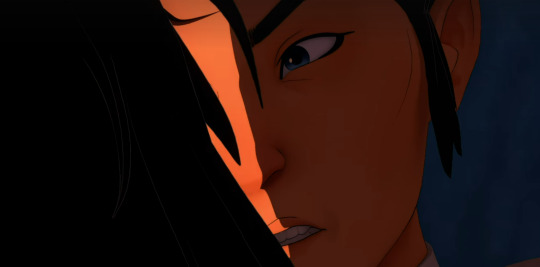

but THIS scene in the forge? warm colours. their laughter and their smiles that both equally genuine. the WAY taigen looks at mizu in that scene, staring first at her lips, her smile, then looking into her eyes. and you can see by the framing of the scene and the look on his face that he is, for the first time, seeing her eyes as something beautiful rather than off-putting or frightening.
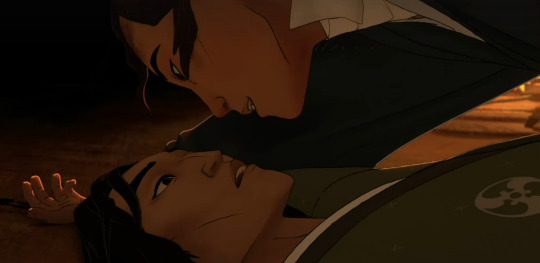
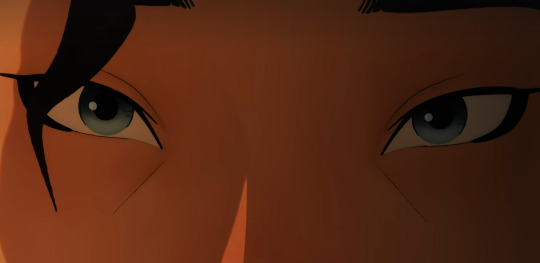
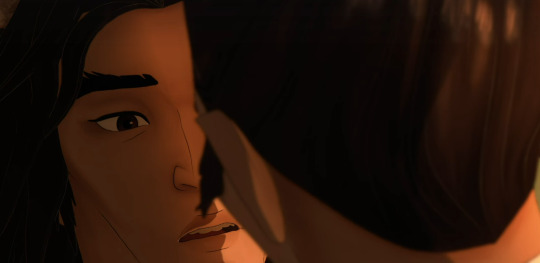
like before this point he's already come to not only respect mizu as a person and an equal but also admires her as an incredible swordsman and as someone who is kind and honourable* for having saved his life at the expense of her revenge quest. so as of the time of them tussling in the forge, taigen has already put aside his prejudices about mizu's blue eyes and no longer finds them as any cause for disgust. but in this scene he's not just indifferent about her eyes, but attracted too it.
and i'd also like to argue that his boner is not from the physical exertion or the act of wrestling itself, but from the intimacy of a playful spar, enjoying each other's easy company after having established a deep trust with each other (taigen endured torture for mizu and helped defend her from archers in the chasm while mizu saved his life from fowler's castle)
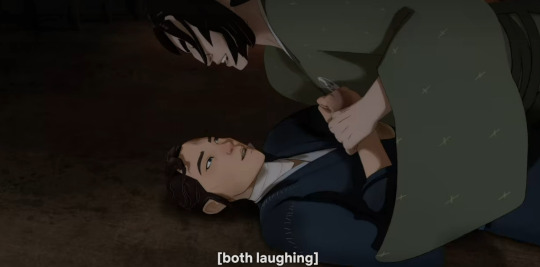
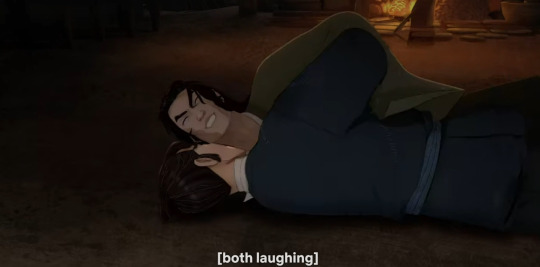
and all this while in the safety of mizu's childhood home while both of them are still recovering from near-death, amplifying their vulnerability with each other.

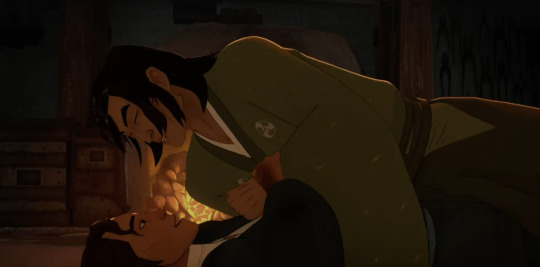

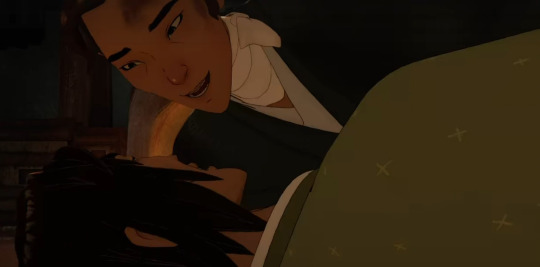
like when was the last time mizu cracked a genuine smile, let alone a laugh that's more than a little wry chuckle?? and for this to happen at such a low point in her life also speaks to the comfort this little friendly spar gives her.
because like, this is after she failed her mission to kill fowler. meanwhile her sword--the embodiment of her soul--is broken, and ringo who is her closest confidant is now angry at her and barely even looks at her. it just further lends to the inherent tenderness and intimacy in this scene. and i just. AHHHH i love them your honour....
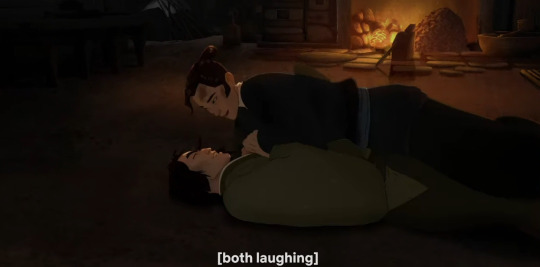
* ALSO as a side note about taigen believing mizu to be honourable: he later realises that this assumption turns out to be quite false when she reveals that she'd not only allowed akemi to be taken away against her will but also has said nothing about fowler's impending attack on edo.
also i find it very interesting that out of the two revelations, taigen is less angered by mizu letting akemi being married off (he sighs angrily and marches off saying he has to go to edo to find akemi), but much more angered by mizu's refusal to save the shogun and the shogunate as a whole.
this is more proof that taigen's central principles are firmly rooted in the bushido and the concept of honour that comes with that. it's why he lashes out at mizu. because he'd believed mizu to be honourable and righteous, but was proven wrong. that's not to say that taigen is in the right for calling mizu a demon, not by any means. but i just find it a very interesting part of his character and it relates to his relationship and perception of mizu
also while rewatching the episode i found this very funny they just lyin there in the cart like this 🧍🏽♂️🧍🏽♂️
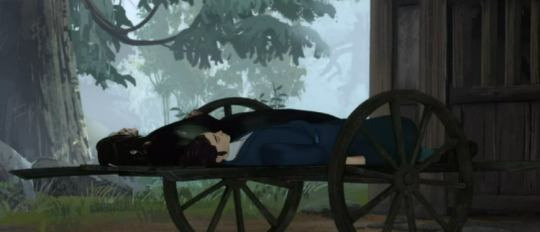
#blue eye samurai#mizu x taigen#taimizu#taizu#taigen blue eye samurai#mizu blue eye samurai#blue eye samurai meta#sorry yall but i prefer taimizu as the ship name so i'll probably just be using that from now on 🫡#also like.. the way im still recovering from covid while i have 2 deadlines back to back tomorrow and the day after#but im too busy hyperfixating on this show!!!!#if only i could channel all this energy into my actual literary studies papers that'd be great#but at the moment i be caring more about these fuckers than whatever william blake's got going on#jk i do still love william blake's poetry but my stupid ships take up way more space in my brain ykwim 🤒#anyway...#shut up haydar#meta dissertations.pdf#fandom.rtf
706 notes
·
View notes
Text
We all already know Mizu and Akemi are narrative foils. But you know what? Lemme just say it, here's what I think:
Taigen and Mikio are foils.
Not necessarily to each other as individuals in the way that Mizu and Akemi juxtapose each other, but mostly in the contrast between their relationships with Mizu.
I've covered specific parallels between Taigen and Mikio in other posts I wrote; but as the number of parallels I'm noticing between them keeps piling up, I'm compelled to just compile them all in one post. So! This is, thus, the post in question.
First of all, let's look at their similarities.
1. Their status in society is the same. They are both samurai who lost their honour and have dreams of reclaiming it.
2. They are also both diligent as they strive to achieve this goal, they both care deeply about their work, but here as they begin to contrast, as the work in question and way they go about their goals is different:
For Mikio, his work is in taming and rearing horses; in order to prove himself, he must tame Kai—a willful and strong horse—and present it to his lord.
For Taigen, his work is in sword fighting and martial arts; in order to prove himself, he must kill Mizu—a willful and strong swordsman—and present her dead body to his lord.
In the parallel above, not only are Taigen and Mikio contrasting each other, but Mizu and Kai are placed in comparison as well. And of course, Kai is Mizu's horse, and represents her. Which is why, when later, Mikio sells Kai off, it represents the way he is tossing Mizu (and their relationship) aside.
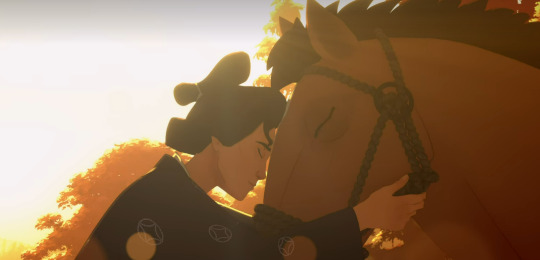
From there, the rest of the details of their character begin to contrast and juxtapose each other more clearly. So let's look at those differences, shall we?
Their backstory:
Mikio was a great samurai who was banished.
A somebody to a nobody.
Taigen was a fisherman’s son who rose to the top.
A nobody to a somebody.
2. The first time we meet them on-screen:
Mikio is an adult. An older man. Mizu's superior in age. He is Mizu's to-be husband. A love interest.
Taigen is a child. A young boy. Mizu's peer in age. He is Mizu's bully. An antagonist.

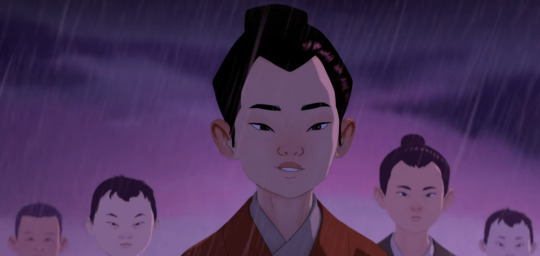
3. Their maturity and growth:
Mikio is mature, but stuck in his ways.
Taigen is immature, but capable of changing and learning.
4. Their overall attitude:
Mikio is generally relaxed, easy-going and unfussy.
Taigen is uptight, irritable and severe.
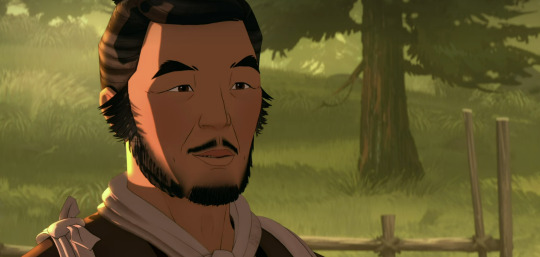
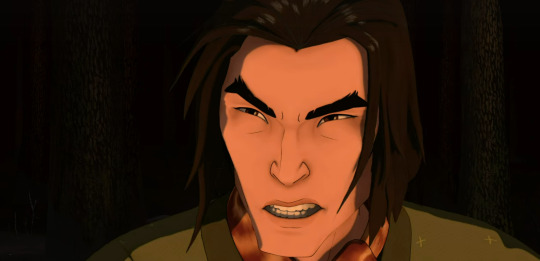
5. How they talk to and conduct themselves around Mizu:
Mikio is aloof, soft-spoken, and serious.
Taigen is obnoxious, brash, and sarcastic.
Mikio is quiet, speaking only when spoken to, even when Mizu turns to smile at him and shows openness to be near him.
Taigen is loud, talking while others are silent, even when Mizu turns from him and shows no interest in conversing with him.

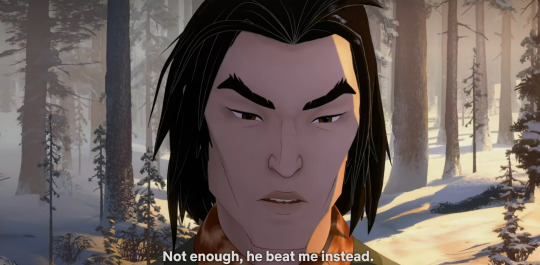
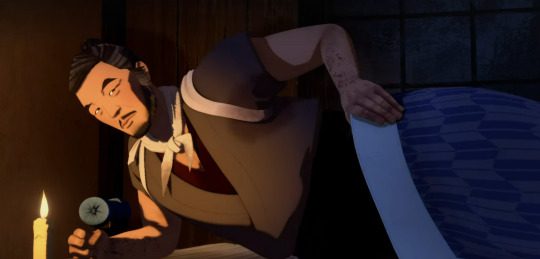

Mikio doesn't show much of who he is to Mizu throughout their marriage, despite their growing affection.
Taigen openly shares his traumas and life story to Mizu during their brief alliance, despite their mutual antagonism.
6. Their external vs internal selves:
Mikio is calm, gentle, and considerate on the outside.
Taigen is hot-headed, rude, and selfish on the outside.
Mikio is cowardly and deceitful on the inside.
Taigen is brave and loyal to a fault on the inside.
Mikio tells Mizu that he wants to know and see all of her.
But he scorns and betrays her, the woman he loves.
Taigen tells Mizu that he wants to duel and kill him.
But he endures torture to not betray him, the man he hates.
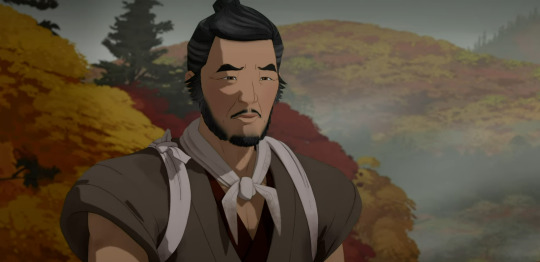
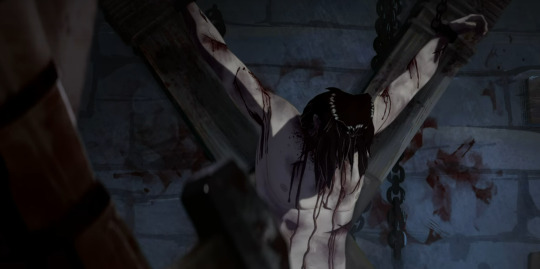


9. Their hair, a symbol of their honour:
Mikio's topknot is untied by Mizu during their spar.
This humiliation occurs in private, the two of them alone in a rural location where no one can see them.
Taigen's topknot is cut off by Mizu during their duel.
This humiliation occurs in public, the two of them being watched by many others in the Shindo Dojo.
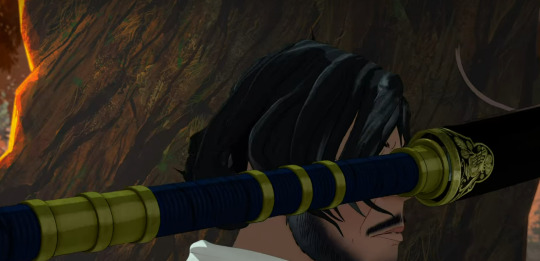
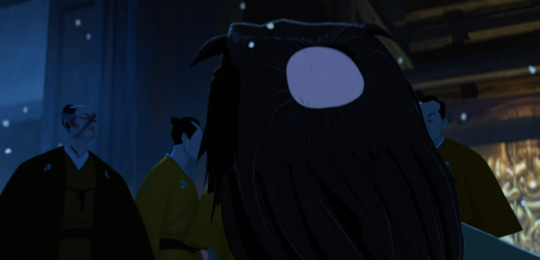
10. Their power dynamic with Mizu:
Mikio believes he is Mizu's mentor.
He teaches her to throw knives, how to ride and care for horses, and about the tactical benefits of using a naginata.
Taigen believes he is Mizu's equal.
He views Mizu as a samurai like himself who received all the same teachings he did, and who possesses the same values.
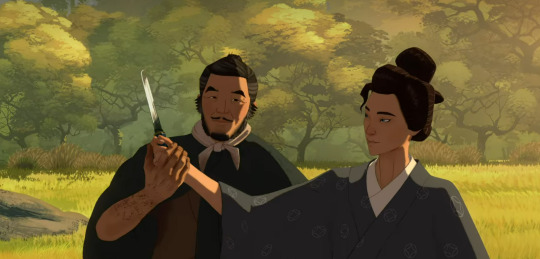
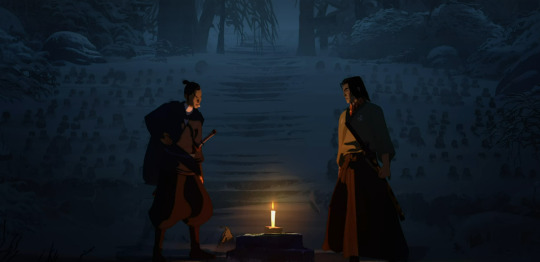
11. Their perceptions of Mizu:
Mikio sees Mizu's feminine side first.
He sees her as sweet and gentle, but also clumsy and incompetent.
Taigen sees Mizu's masculine side first.
He sees her as terrifying and deadly, but also strong and skilled.
12. The way they approach sparring with Mizu:
Mikio only spars with Mizu once. As the fight progresses and she is beating him, he tries to put a stop to it. When she teases/provokes him, he starts taking the fight personally and seriously, finding no enjoyment in it.
Taigen spars and brawls with Mizu all the time. No matter how many times Mizu beats him, he doesn't back down. When Mizu challenges him with a chopstick, he is eager to compete with her and gladly rises up to the challenge.
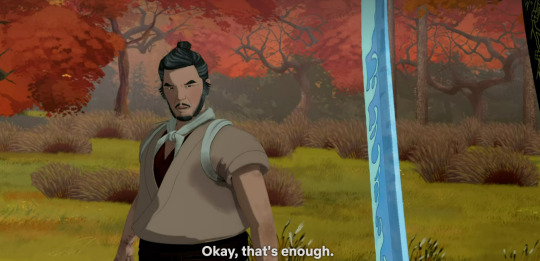
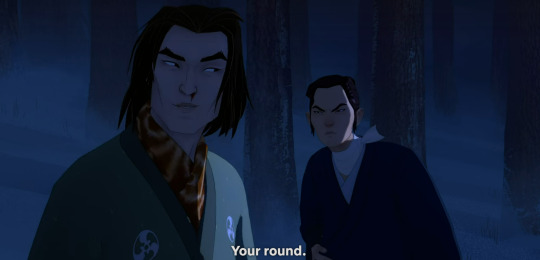
Mikio and Mizu's one and only spar is a friendly match; Mizu is smiling and having fun while he grows increasingly frustrated.
Taigen and Mizu's last-seen spar is a playful wrestling match; both him and Mizu are having fun and laughing.

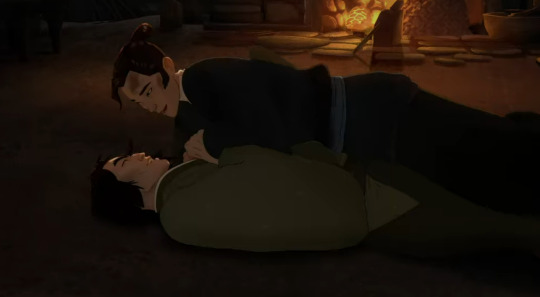
Mikio cannot deal with Mizu being better than him, so he scorns her and walks off, avoiding her thereafter.
When Taigen cannot deal with Mizu being better than him, he follows her to observe her moves and continues training in hopes to eventually beat her.
After being bested by Mizu once, Mikio leaves her and sells the horse he'd previously gifted to her.
After many times losing to Mizu and fighting alongside her, Taigen commends her and admits she is better than him.
13. When Mizu pins them down in a friendly spar:
Mikio sees Mizu's whole face objectively.
Taigen stares at Mizu's mouth and eyes.
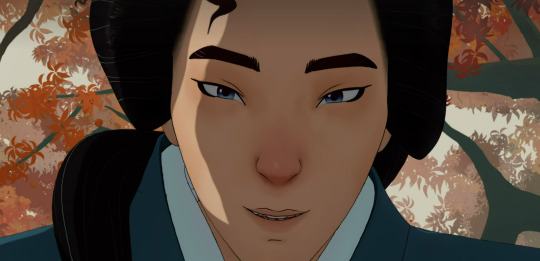

Mikio gets angry when she kisses him, throwing her off of him and snapping at her, calling her a monster.
Taigen gets aroused, apologising, so she pulls herself off of him.
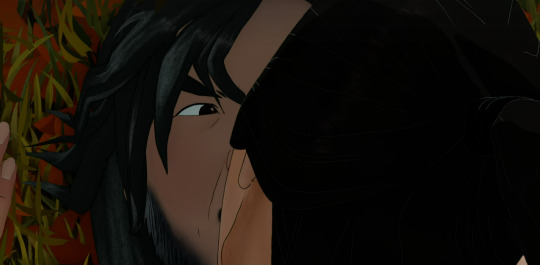
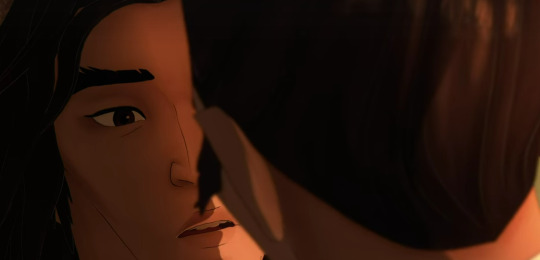
14. Mizu's blue meteorite sword is a reflection of her soul. She believes most are undeserving to face it, let alone hold it. And on that note:
Mikio is the first person (chronologically) that Mizu fights against using her sword.
Taigen is the first person (we see on-screen) that Mizu fights against with her sword.
Mikio is the first person (chronologically) to ever hold her sword, as she passes it to him, letting him wield it.
Taigen is the first person (we see on-screen) to ever hold her sword, as she passes out, and he picks it up and carries it for her.
15. Then, last but not least, in Fowler's fortress, when she is drugged and in pain, she hears Ringo's voice in the dungeon. She then follows it to an open cell:
Mizu first sees Mikio as a hallucination, the sight of him haunting her and causing her to lose her grip on reality. Her eyes glow a surreal blue to represent this.
Her Mama appears then and says Mizu's name accusingly.

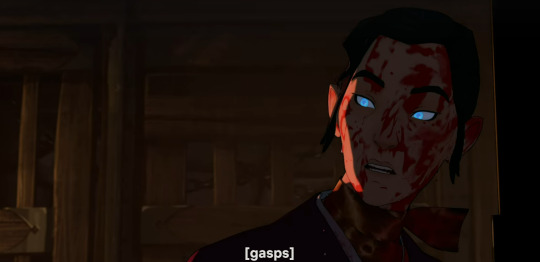
Mizu then sees Taigen, but he is real, the sight of him a relief and grounding her back to reality. Her eyes return to their normal blue colour to represent this.
Taigen looks at Mizu weakly and says her name softly.
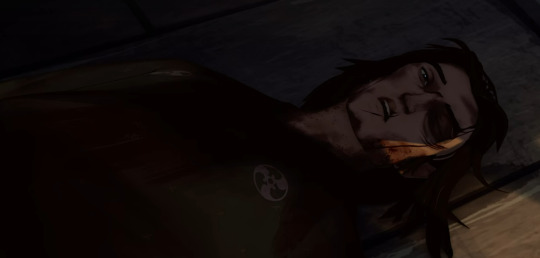

Then, later, when facing Fowler, her revenge awaiting her, she instead chooses to follow her conscience (represented by Ringo's voice in her mind), putting aside her vengeance for a time, in order to save Taigen.
So that's basically all the ones I've noticed so far, but even then, I feel there's already so much that forms a contrast between these two.
What makes it especially incredible about these juxtapositions is that Mikio was Mizu's husband, the man she had fallen in love with, the one person she had ever been intimate with, the man who made her begin to accept herself, to put down her desire for vengeance and instead live a life of peace and happiness.
So for Taigen to have so many parallels with him... Do you see what I'm saying here!
Not to mention that Mizu clearly already has some burgeoning attraction to him, as indicated by how she thinks of him when asked about her desires. And Taigen clearly has shown interest as well (see: him getting a boner after their spar, him holding her hand and telling her, "We're not done yet.").
And on the topic of speculating future possibilities of this relationship, this post by @stromblessed has pointed out yet another parallel between Taigen and Mikio:
Mizu promises Taigen to meet him for their duel in autumn.
Mizu fell in love with Mikio and duelled him during autumn.
With all that said, I do believe Mizu and Taigen's relationship is definitely hurtling towards something. But whether they will actually end up together in a sustainable relationship and have a happily ever after? Well, that is a whole other story; we'll just have to wait and see.
#blue eye samurai#mizu x taigen#taigen x mizu#taimizu#taigen blue eye samurai#blue eye samurai meta#hope yall enjoy my thesis on virgin mikio vs chad taigen#this was written last night when i shouldve been writing the new chapter for my taimizu fic that i promised i would work on....whoopsies...#i will get to it eventually but i just have to get a firmer grip on characterisation before i can delve further into it yk#on that note. i kiiinda regret posting the fic on a whim!#my last longfic was written better because i had the whole thing complete and could go back and edit/polish/revise before posting#so it came out much more coherent and consistent ykwim?#this fic might suffer a bit for this reason 🤒#but its fine i have to remind myself im just doing it for funsies#anyway here have another long ass meta post from yours truly#meta dissertations.pdf#shut up haydar#fandom.rtf
431 notes
·
View notes
Text
I just keep obsessing over how Mizu is so many things. She truly is water, so deep and unfathomable and complex, ever-changing, ever-adapting, fluid and mysterious, she fits into every shape you pour her into, she is gentle yet vicious, soft-hearted yet callous, stoic and quiet yet still sarcastic and playful.
She is Japanese and white and both and neither, she is woman and man and both and neither, she is human and demon, she is ronin and bride and Onryo and phoenix.
She is also a sword; Mizu and her sword are one.
"The sword is the soul of the samurai."
"I am... made of mixed metal. No amount of hammering can remove my impurity."
"What is a sword? [...] It is a line. On one side of the line is life. The other, death. The edge we forge cuts the line between life and death."
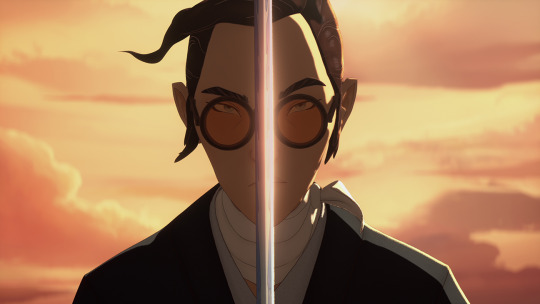
Mizu's soul is thus represented by her blade, but Mizu is also
the metal: beautiful, strong, sharp, and precise, but ultimately neutral, neither good nor evil, as metal can be used to craft both weapons of death, or knives for cooking and nourishment;
the maker: artistic and passionate, the maker creates;
and the one to wield it: deadly and swift, the swordsman destroys.
In the first episode, we don't even see her blade for much of it, only mentions of it, as she doesn't even deign to fight someone like Hachiman the Flesh-Trader in Ringo's noodle shop.
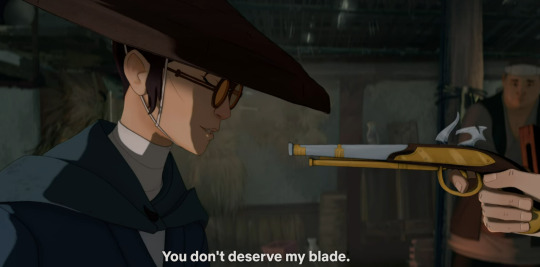
Most people don't even deserve to see her blade. And who is the first person in the show whom the sword is even shown to? Well...
Taigen: "Are you afraid to fight with steel?"
Mizu: "Thank you. No one has yet deserved my blade."
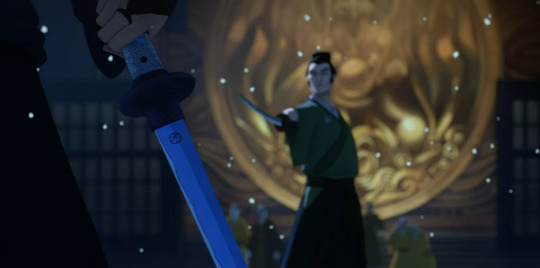
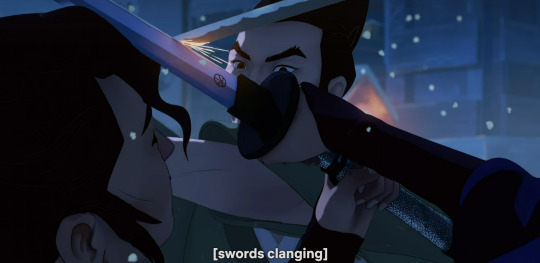
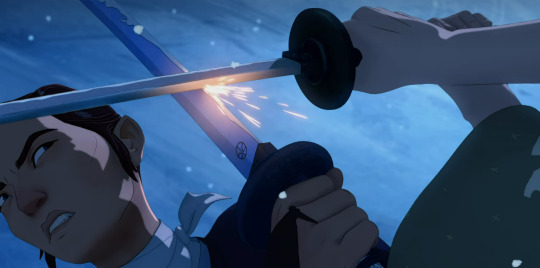

And then, more crucially, who does she actually allow to wield her blade? The first person she spars with? It is none other than Mikio, her husband.
She literally passes him her sword, letting him wield it for the rest of their fight, taking his naginata in exchange. Not purely a crossing of blades, but an exchange of it. Mizu is literally baring her soul to him and putting it in his hands.

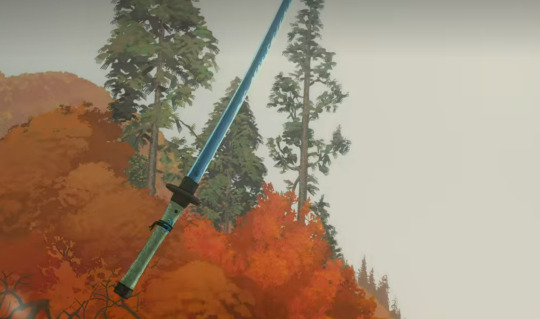

In the whole show, the only other time we actually see someone besides Mizu holding her sword is after Mizu kills the Four Fangs and passes out from her wounds. Ringo picks the unconscious Mizu up, and in the process, her sword slips from her hand.
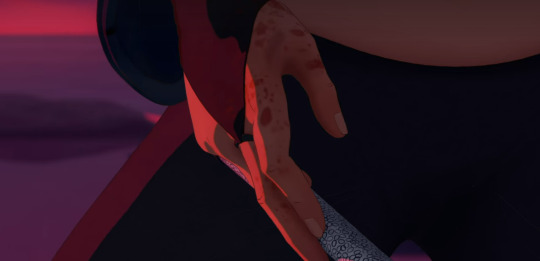

And then, resisting his selfish quest to reclaim his honour, Taigen tells Ringo a safe place for Mizu to recover and follows them both there, but not before he takes Mizu's sword, and also Chiaki's broken blade.
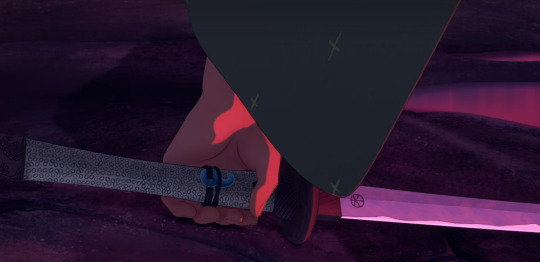
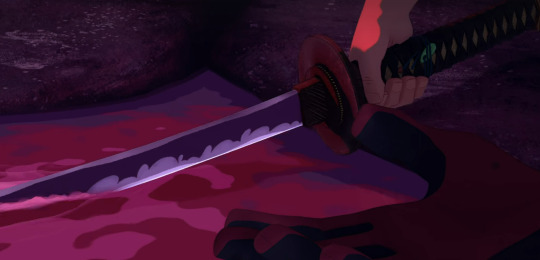
It is brief, but he does hold it, and the shot focusing on his hand picking it up places further emphasis on this fact.
Now, about the broken blade, @saessenach told me something very interesting, which is that when Mizu had helped craft this sword, it was made for the man she believed Chiaki was. And who exactly is that again? Let's go over the cover story he related to Master Eiji:
"I am not a swordsman. I bind books. I was taught my trade by... my father. He was killed by a drunk ronin, who cut my father down for splashing him with his cart. This ronin is a drunk, but he is skilled as I am not. He will kill me. I know this. But with a sword from you, Master, I can take his life as he takes mine. And die avenged."
So, as @saessenach so aptly put it, the broken blade "was made for a man who wanted to regain his honour from a stronger swordsman. He doesn't expect to survive the duel, but would just like to die with honour."
And doesn't that sound familiar? Like Taigen, a man who would also like to regain his honour by duelling a swordsman stronger than himself? Taigen, who had also come from nothing, who was raised not to be a samurai, but a humble fisherman, by his father who is now dead?
So of course that's why, when Taigen wields that broken blade, despite not even knowing the story behind it, Ringo unwittingly glimpses it anyway, and says this:
"Master Eiji's broken blade is a good fit for him."
Mizu just shrugs and frowns, refusing to accept it, because the sword isn't just bearing Master Eiji's signature, but also hers. A part of her is in this sword, just as a part of her is in all the blades she makes (though none of them are her soul, which is represented only by her meteorite sword).
But then later, after fighting together and barely making it out from the chasm of arrows alive, after seeing each other's skills, only then does she admit to Taigen:
"The broken blade fits well in your hand."
Which is why she (after knocking Taigen out and leaving him lying in the snow LMAO) leaves him with the broken blade, and again comments on how it "so well fits his hand."
Also, on the topic of the broken blade, why did it break again? Well, Mizu is one of the sword's makers, signing her name on it, thus putting a little of her soul into it as I already mentioned. According to Master Eiji, this process of the soul entering the sword occurs during the yaki-ire:
"The yaki-ire is when metal is reborn, and the soul enters the sword. All must be pure for the sword to be pure. The metal, the maker, the one to wield it."
As this process unfolds, this conversation happens:
Eiji: "Mizu. Is your mind clear?"
Mizu: "It is."
Eiji: "Mizu. Is your soul at rest?"
Mizu: "It is."
However, after Master Eiji presents Mizu with the finished sword, it breaks, much to Mizu's disheartenment.
Chiaki: [About the blade being broken] "How could this happen?"
Eiji: [...] "An unexpected element entered the blade." [...]
Mizu: "The fault is mine. The element is me."
Mizu is right; she is "the unexpected element" that broke the blade, but not because of her race, nor her gender, but because her mind is not clear, and her soul is not at rest.
Why? Because the yaki-ire takes place right after she binds for the first time; she is in pain both physically and mentally, ashamed of who and what she is, hiding her true self, trying to smother an inherent part of her identity.
Then, about Bloodsoaked Chiaki wielding a sword which is broken, Master Eiji says this,
"A soul like that is drowned in blood. There is no stopping them. They will always find their broken blade."
This parallels Mizu breaking her blade after her rampage through the nine levels of Shindo and Fowler's fortress, after she gets literally soaked in blood.
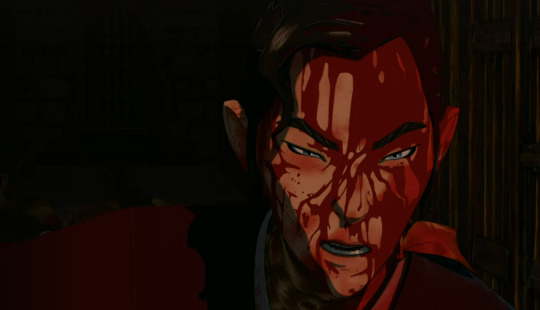
After storming the fortress, her blade, too, is broken, and she is unable to melt it down and repair it.
Master Eiji: "Your sword broke because the blend was wrong."
Mizu: "It was perfect."
Master Eiji: "It was too pure. Your metal wants to be blended with new steel."
The sword, as, Mizu's soul, houses all the rage that has festered over the years. The purity of its meteorite steel represents her single-minded, hate-driven goal for vengeance.
On that note, it's interesting to remember that the meteor fell in front of Mizu during her confrontation with Taigen and his gang of bullies. That encounter was the beginning of her rage, the moment she stopped running and hiding, and instead fought back, clawing and throwing herself at the people who mistreated her. The meteorite thus represents her anger, her fighting spirit, her resistance.
Over time, she crafts her sword--her soul--purely out of this anger, and sets off on her revenge quest.
Of course, she then meets her mother, gets married to Mikio, and after their betrayals, Mizu once again resumes her quest.
But after her journey seeking Fowler, after meeting Ringo and Taigen and Akemi, Mizu's soul no longer feels singularly bound to her hate. She's made friends, she's starting to let people in, but she still suppresses those feelings, still insisting that she is just an Onryo, that she has no room for love or friendship or weakness, despite the fact that those are things her soul craves and needs deep down. She needs gentleness and respite, she needs to allow herself to be vulnerable and allow herself to love again, because she's not a demon--or at least not completely.
"There may be a demon in you..."
When Master Eiji says this to Mizu, he's not insulting her; by demon here, what he is referencing is the part of Mizu that is capable of great wrath and violence. Just like a demon is.
"...But there is more."
Mizu is still a human being. And she should let herself be one, should allow herself to feel more than just rage, but also joy, grief, love, and even pain.
"If you do not invite the whole, the demon takes two chairs."
So that's when she finally allows herself to start "allowing the whole"; she stands in front of the fire completely naked, no longer suppressing her true self, and melts the metal of those she collected, which are, in order,

the broken blade that now represents Taigen;

Akemi's knife;

Ringo's bell;
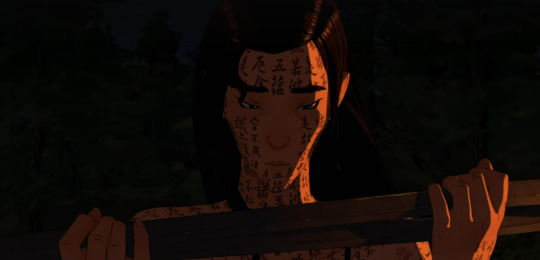
and Master Eiji's tongs.
These are people whom she cares about, who compel her to open herself up and see beyond her hate, who make her feel like she is capable of being more than just a demon.
By blending their steel into her future sword, she is accepting them, and the lessons and values they had taught her along the way, into her soul.
But as it stands now, Mizu does not have that sword. Not yet, for it's yet to be forged, as she gives the blended metal to Master Eiji.
Mizu: "If I succeed [to kill Fowler] and am still alive, I will return. And you can determine if I am worthy of a sword of this metal, made by your hand."
Which is why, in the finale, Mizu only fights with a random assortment of weapons she picks up (a sword, a naginata, a gun--but never shoots it--and the dagger Fowler stabs her with).
And then of course, Fowler drops the big reveals about Skeffington and Routeley; about her birth mother having been killed by one of the white men; about her Mama actually being a maid who was paid to keep her hidden.
With all this, there is so much she's still yet to know about who she is, who her parents are, and her identity is left hanging. So she leaves Japan not only to kill the remaining white men, but also to discover more about herself and her heritage--her white half. And this also mirrors the way she looks at the very end:

her hair grown out, her bangs identical to how she looked as a child; no longer wearing a scarf around her neck, no longer covering a part of herself.
Thus, Mizu will eventually receive her new sword that matches the new state of her soul, made of steel that "could kill a god."
But for now, she needs to understand who she really is, to discover the full breadth and complexities of the metal that made her, and the hidden depths within herself. In doing so, she must also learn to accept her anger as a tool, but cannot let it control her lest she become a demon; thus, she must allow herself to love as much as she hates, and most of all, simply let herself be.
Only then, can she claim her sword--her soul.
#blue eye samurai#mizu blue eye samurai#blue eye samurai meta#mizu x taigen#taigen x mizu#kinda? i mean it's implied but you can also take it platonically#sorry i go crazy about taimizu im unwell <3#taimizu#shut up haydar#meta dissertations.pdf#fandom.rtf
365 notes
·
View notes
Text
Thinking about the crazy love triangle situation in Blue Eye Samurai and debating heavily with myself on how I'd like to see it conclude. And yeah this discussion can be thought of purely as shipping, headcanons, and fandom fun. But when analysing the show and engaging with it in a more in-depth, almost-literary level, it's impossible to dismiss who Mizu's potential love interests are and how different endgame romances would affect her character arc and the overall story and themes.
So in this post I'd like to look at the love triangle a bit more closely, and speculate on where the story will take this.
DISCLAIMER: It is my personal interpretation of the text that Mizu is non-binary—I use this as an umbrella term denoting any gender that does not adhere to the binary restrictions, norms, and expectations of what it means to be either a man or woman in a particular society; it's not just an androgynous "third gender" that exclusively uses they/them pronouns. Thus, while I personally believe Mizu is not strictly a cis woman, she does still identify with womanhood, despite definitely feeling a level of detachment from it due to living as a man for so long. With that being said, I will be using she/her pronouns for Mizu in this post, but please note that this is purely personal preference. Everyone is free to interpret the text the way they like. That's the fun of fiction. Now, without further ado, let's proceed.
Okay so, thinking about the pairings on a purely surface level, and even before i got into the show, I was pinning my hopes on some lesbianism going on between Mizu and Akemi, and the show does hint at this; in Ep1, during their first encounter in Kyoto, there is the famous slow-mo shot of their eyes meeting, Mizu's lips slightly parted as she is unable to tear her gaze away from Akemi, while sweet string music plays in the background. This is clear romantic framing, and a marker of attraction. If Mizu was a cishet man, there would be no question that this is a potential love interest.
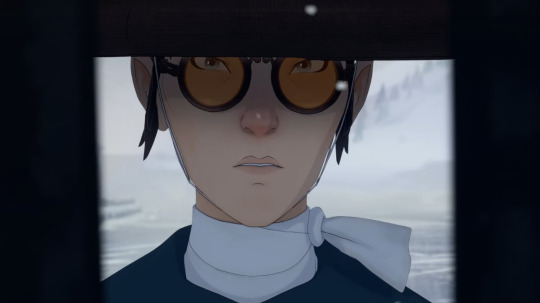
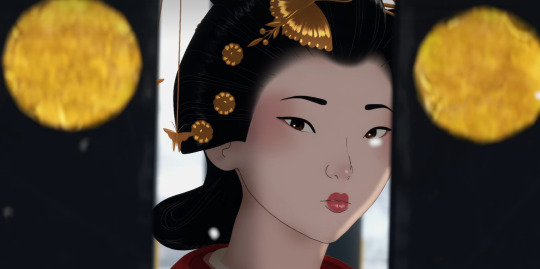
But then, in the same episode, we meet Taigen, who is introduced to us firstly from hearing Akemi's father describe him as "a fierce and undefeated young samurai", the "best swordsman in the best school" and "a fisherman's son from Kohama [...] whose rise reminds [him] of [his] own."
In the next scene, we meet him in person as Akemi's fiance, and he seems sweet enough. He even gives her sweets! In exchange, Akemi gives him gold, and he feels a bit ashamed that he doesn't have anything better to offer her. But Akemi accepts him and his gift wholeheartedly and flirts with him a little, which makes him smile kinda shyly.
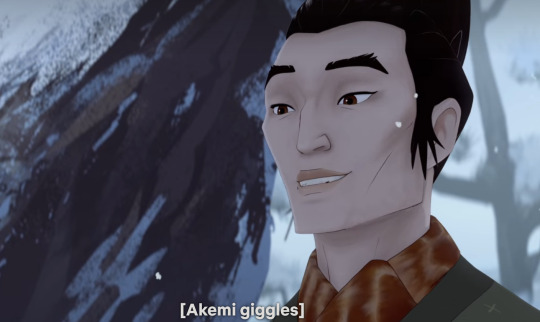
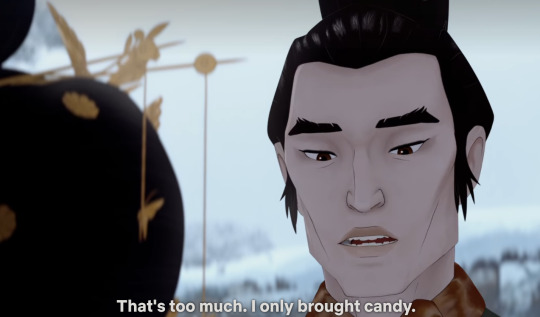
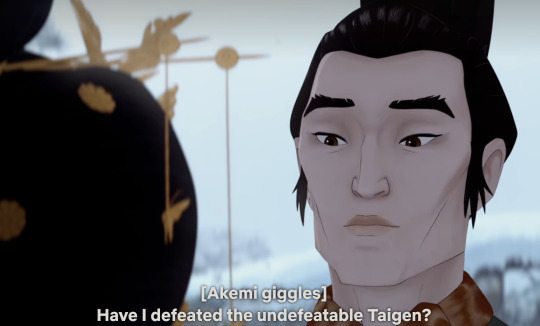
When Akemi confirms their engagement, Taigen is in disbelief because he has no status or noble background, but Akemi reassures him.
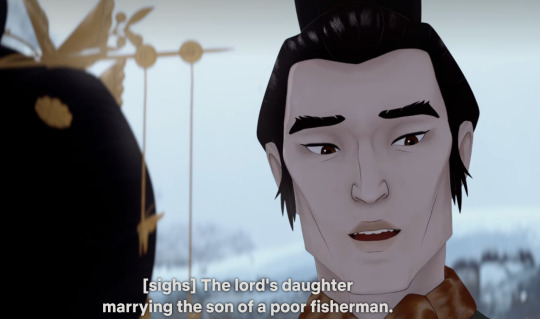
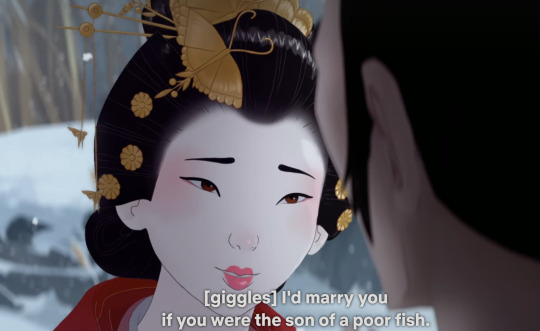
So from these first few scenes, we're introduced to Taigen as an honourable and strong samurai, but also as a man who is sweet and gentle with the woman he is about to marry, as well as aware of his own inferiority when compared to Akemi's high station.
Our view of him then changes as his true self is revealed: he is an arrogant and smug bastard among his peers, but more importantly, he is the terrible bully from Mizu's childhood.
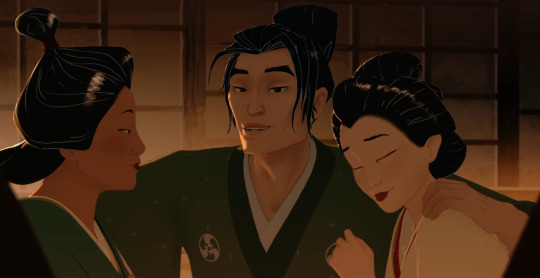
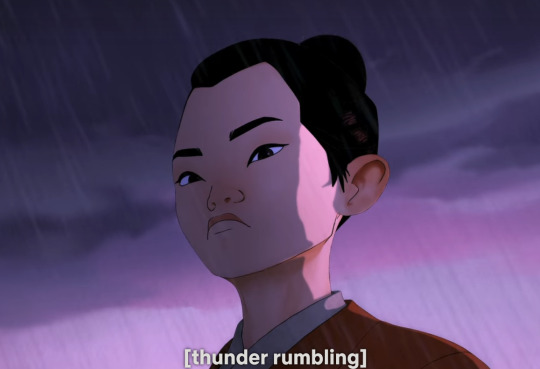
And it is this side of Taigen--pompous jerk and unrepentant xenophobic bully--that we continue to see as the show goes on, and it's safe to say that this is his real self, sans any pretense of humility and modesty. Around anyone who isn't an outright superior in terms of class and power (ie. Akemi's father, the shogun), Taigen never hesitates to assert his own authority and "greatness."

But as the show goes on, he gets caught by Heiji Shindo's men, and then tortured. And that's when we see, okay, turns out he's not that bad. He's honourable; "honour" is not just meaningless and superficial pedantry for him, but an internalised, guiding principle.
He was a cruel asshat throughout Mizu's childhood, but in a prejudiced and xenophobic society, he was just playing by the rules. As a child, he knew he was at the bottom of society, but when met with someone even lower ranked than him (Mizu), he can project all those prejudices and insecurities onto someone else. This way of thinking--"if you can't beat 'em, join em"--is what allowed him to climb up the ranks despite being some dirt poor kid from an abusive household*.
*Well, that combined with his cismale privilege of course, because this would not be an option for a woman in similar circumstances.
Thus, his upholding of honour also exemplifies how Taigen embodies the ideals and rules of his society. His insistence on duelling Mizu is another more blatant example of this. He doesn't want revenge like Mizu does. He wants to be accepted by society, within the bounds that society has placed, and that means that his only two options following his defeat at the Shindo dojo were to either chase Mizu down and get his damn duel, or kill himself for his humiliating defeat.
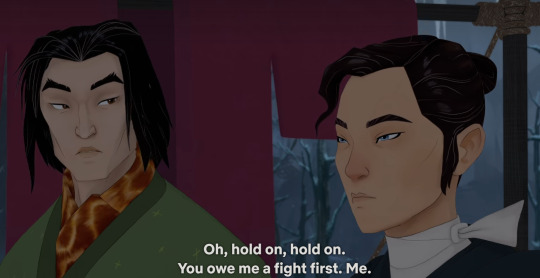
Now! Moving on from Taigen, let's go back to the other end of this little love triangle: Akemi.
Mizu and Akemi only properly meet in Ep4. During their first meeting, when Akemi tries to poison Mizu in Madame Kaji's brothel, she compliments Mizu's eyes, calling them "beautiful."
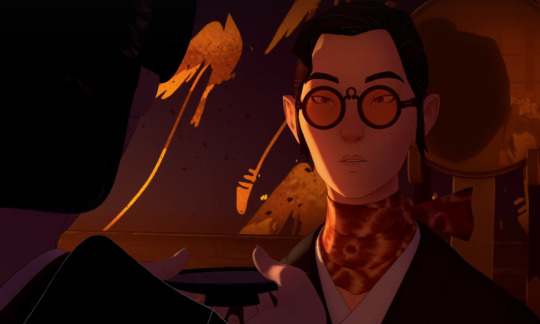
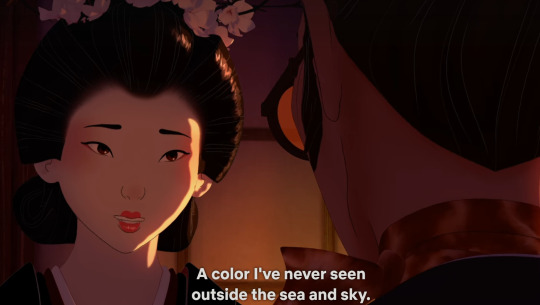
This seems to genuinely take mizu off-guard for a second before she coolly plays along. We know that Mizu recognises Akemi from the get-go, and thus sees through Akemi's ploy from a mile away. It's also safe to assume she'd expected false flattery, because Mizu understands full well that this tactic is how women get what they want: by using their 'feminine wiles' and playing up their naivety and innocence. But even so, it's interesting that Mizu actually seems surprised by Akemi's compliment.
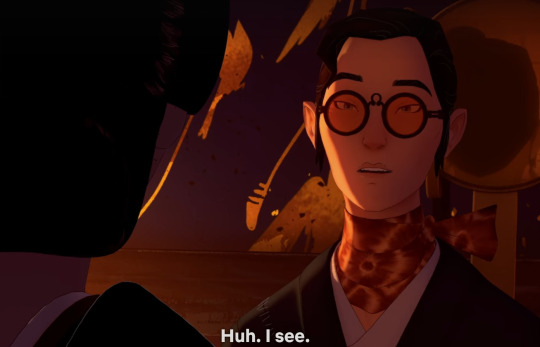
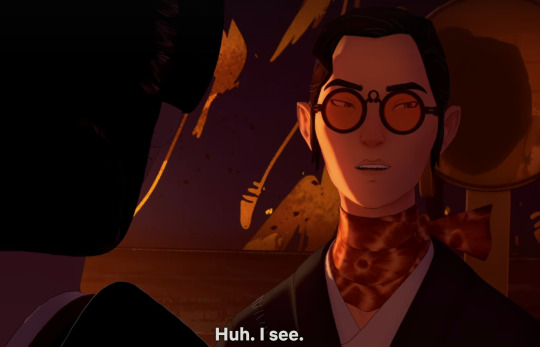
Then, after Mizu subtly taunts Akemi by lying about Taigen's death, she and Akemi have a bit of a scuffle, and then we get to Mizu saying this:
"Women in our world don't have a single good option. Except you, like some magical forest creature. You could have anything you want, but then you beg to eat trash."
(no screenshot because it's quite a long line but you get it)
Here we see Mizu's opinions on the marginalisation of (mostly poor and under-privileged) women stated outright, and underlying her words is also resentment. Because even though she and Akemi have shared experiences of female oppression, Mizu, unlike Akemi, was also poor, from a rural village, and is a racial minority. Mizu is triply oppressed, while Akemi only faces one primary form of oppression, and to someone as embittered by the world as Mizu is, to see Akemi "beg to eat trash" is a slap in the face, practically tone-deaf to the other injustices around her--injustices which Akemi has not shown much, or any, acknowledgement for at this point.
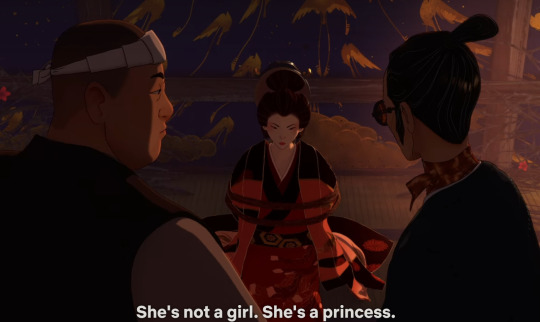
Then, after this scene, Mizu kills Kinuyo, and this unsettles her to a degree we've never seen from her before. She is visibly distraught, and the entire sequence hammers the theme of this episode (and arguably, a large portion of the show) into our heads: women in this world suffer. And even though Mizu is well aware of this fact, to commit this act is so visceral that is shakes her to her core, and it's what ultimately leads to the ambush of the Thousand Fangs.

But before the ambush, Mizu and Akemi talk a little again, and during this time Akemi taunts Mizu some more.
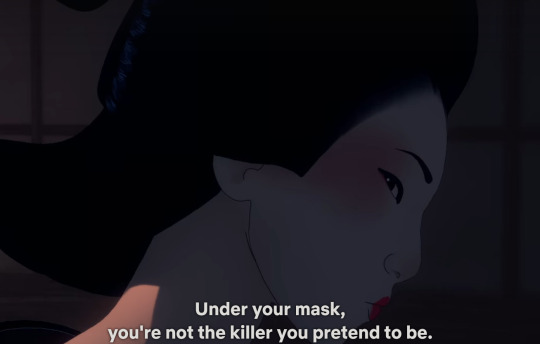
Right now, Mizu is exhausted to the point where (I believe) she even downs some sake, despite not usually drinking. Thus, worn down, she cuts Akemi's ropes and tells her, "Just go." Akemi recovers from her initial fear of Mizu's blade and taunts her some more, accurately seeing through Mizu's facade of coldness, recognising the raw anger there, and says this:
"I thought you had to be something special. Your face isn't even so scary. You're just... angry."
At this, Mizu is amused and compares Akemi to Taigen ("I see why he likes you. You're just like Taigen when we were children. A fucking brat.")
The reveal that Mizu and Taigen knew each other in childhood surprises Akemi, but before either of them can say more, everything goes to shit.
That's when we get to Ep5. This episode focuses primarily on Mizu, the central piece of this love triangle, and does the most out of all the episodes to shed some light on her character and goals, fleshing her out to be more than just the vengeful, highly proficient samurai we've seen thus far (symbolised by The Ronin), but also a person who is capable of love, domesticity and gentleness (symbolised by The Bride). But in the end, Mizu rejects both these ideals, instead becoming an Onryo, who is neither guided by pride/honour, nor love.
By 'reincarnating' into an Onryo, Mizu is able to win the day and save the women in the brothel. However, as she has now fully embraced her status as an Onryo, and is exhausted physically, mentally, and emotionally, she lets the Tokunobu clansmen take Akemi away while Akemi's screams echo in her ear.
Mizu says this choice is for Akemi's own good, that Akemi's better off; because Mizu is jaded and weary, and cannot afford the luxury of idealism, and thus must always be strictly practical and realistic. So of course that's why, in her view, yes, Akemi should not be wasting her time in a brothel where women are exploited and abused, nor should Akemi be so naive to think that her marriage with Taigen is even still possible. However, regardless of Mizu's views, it is not for her to decide, because though Akemi is privileged in some sense, she is still trapped and voiceless, and deserves the right to choose her own destiny.
But as it happens, in the end, though Akemi did not choose who she gets to marry, she DOES get to choose her next move when Edo burns down.
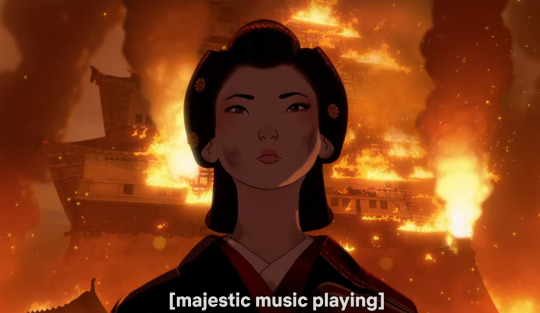
"I want to be great."
This one line is the key to her entire arc, which is only just beginning. We see she quickly has acquired the affection and good graces of the shogun's son after their wedding night and consummation, and with Madame Kaji and the girls now serving her, Akemi will only grow to become a prominent political player.
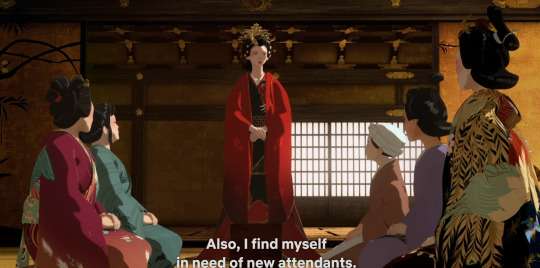
NOW, only after analysing the characters as they are within this season, only can we speculate how their arcs will continue as the show progresses.
First and foremost, I will reassert the popular opinion that Mizu and Akemi are foils. The climax (pun intended) of Ep7 illustrates this as it parallels the turning points in both Mizu's and Akemi's arcs:
Mizu melts the steel of all her loves and shames, the people she's collected: the broken blade wielded by both Chiaki and Taigen, Akemi's knife, Ringo's bell, Master Eiji's tongs - this symbolises her beginning to accept herself, and in doing so, also accepting the help of others;
Akemi consummates her marriage with Takayoshi Itoh, gains his affection, and cements her position as a woman in the shogun's palace - this symbolises her taking charge of her situation, no longer playing the damsel, but using her position to her advantage, empowering both herself and the underprivileged women around her.
These are thus two directly contrasting, diverging journeys:
Mizu's arc moves inward (yin). It is an internal path of self-love and self-discovery, focused on finding peace and tranquility inside herself, and this involves allowing herself to let others into her life, opening herself up to friendship and empathy once more.
Akemi's arc moves outward (yang), it is an external path of growth, transforming from a naive, caged princess to a powerful woman and a force to be reckoned with.
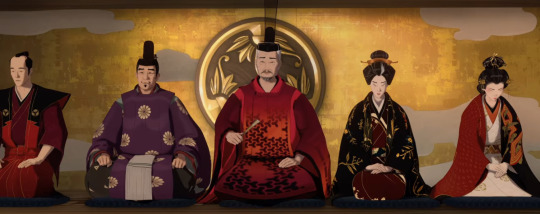
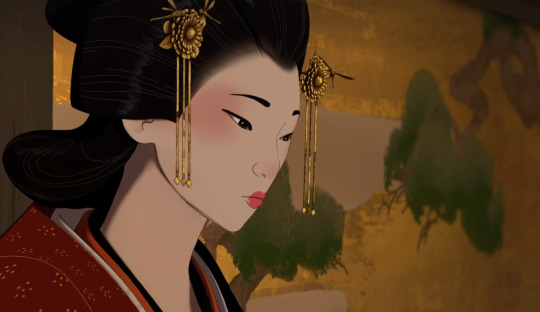
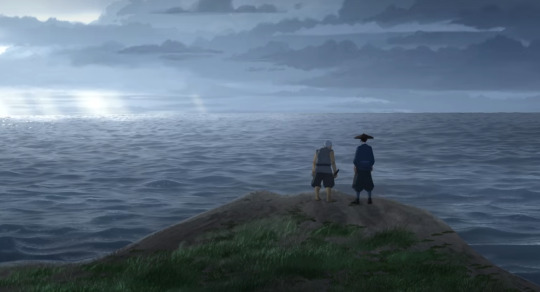
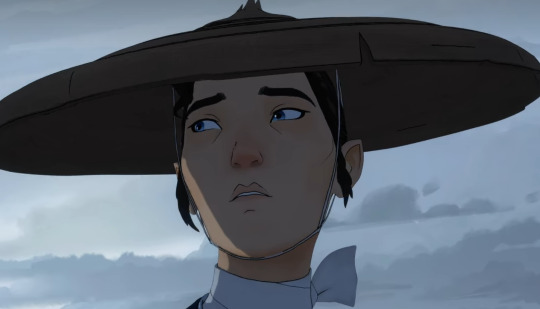
Akemi is always dressed in red, even her eyes are a bit of a reddish-brown rather than brown-black like most other characters, and in her penultimate scene she stands against a backdrop of flames. She is fire: quick-tempered, passionate, full of energy. Red is powerful, authoritative, and in eastern cultures, it is associated with prosperity.
Mizu is blue: her eyes, her sword, her clothes. She is also named after water; it's where she goes to recover, reflect and meditate. Water is fluid like a brook weaving around a stone in its path, always changing and adapting, it is graceful, it is beautiful and ruthless, tranquil yet swift.
Thus, in the future, I expect we will see plenty of political manoeuvring and intrigue in Akemi's plotline, where she fully embraces control of her life, and begins to take action to help others as well, realising that her own oppression is just one piece in a much larger picture. Her main conflict is with society.
In direct contrast, Mizu's main conflict is with herself. She must realise that her desire for vengeance is a projection of her own deep-rooted self-hatred. Her arc must move towards unpacking her feelings and trauma so she can be at peace with herself and allow space for love in her heart. Because as we saw in Ep5, Mizu had come extremely close to achieving peace and joy, as she had not only loved Mikio, but also had briefly believed that Mikio had loved her (and accepted her for who she is) as well.
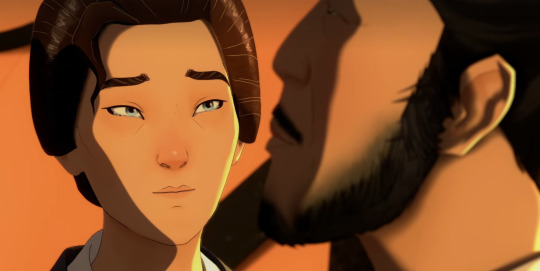
Thus, assuming the story is not planned as a tragedy, Mizu will likely end up getting her vengeance, but it will not satisfy her, because it is not what she needs. What she needs is to let go of the Onryo within her and to reconcile both The Ronin and The Bride within herself, as she is both a fighter and a lover, but not a monster.
(Edit: I recommend checking out this post by @stylographic-blue-rhapsody for a much clearer analysis about Mizu'a symbolism as Ronin, Bride and Onryo!)
And now that we've mostly covered each of the characters individually, we can finally get to the main point of this post: the love triangle.
--
Let's talk about Option A: Akemi.
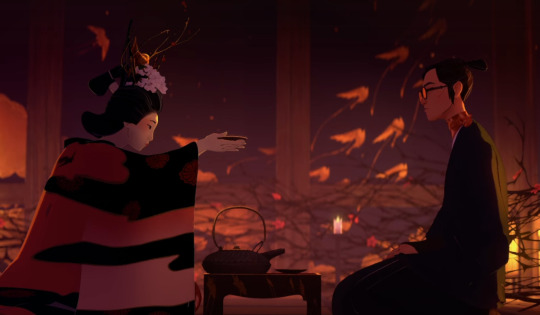
As I covered extensively earlier, Mizu and Akemi are foils, a yin-yang pair. But while they play off each other very well in a thematic sense, I personally believe that a serious romance between them will be more complicated if they become endgame. This is because Akemi's natural resolution is to embrace a position of power and influence, where she has both freedom and control over herself and to make much-needed changes in a prejudiced society. Meanwhile, Mizu's natural resolution is the opposite; her happy ending would to find a peaceful life where she is safe and free from prying eyes, and able to be her true self.
Thus, it would make very little sense for Akemi to forfeit power and run away with Mizu and start a humble life together. Akemi wants to be great, and that is absolutely what she deserves. On the other end of the spectrum, it would also make little sense for Mizu to dedicate her life in service of Akemi, such as acting as a bodyguard or something similar, because a life in a palace full of court intrigue and conspiracies is far from what Mizu needs to be happy.
With that being said, if Mizu/Akemi is endgame, and assuming their overarching character arcs do not shift directions, their love story would likely be either tragic, doomed, or bittersweet. I do absolutely love this type of story because personally I'm a sucker for catharsis, so it would be very interesting if the writers do decide to take this route.
Also, as a note, please do not take this as me dunking on this pairing. This is just my personal opinion and analysis and I completely understand if you disagree!
--
Then, of course, we have Option B: Taigen.
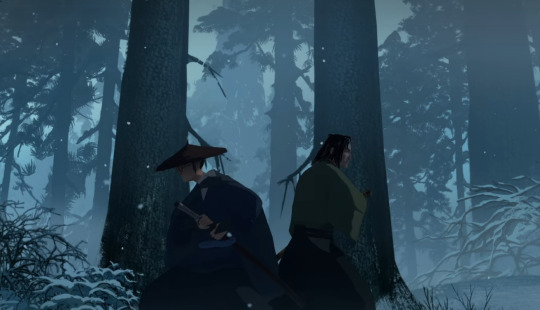
Between Akemi and Mizu, Taigen is a bit of a free-floater here, because Season 1 leaves off at a point where his arc is very ambiguous as to where it's headed. While Akemi climbs for greatness and Mizu goes on a journey across the ocean to (presumably) discover more about her heritage, we have little clues about where Taigen is headed. And if I'm being honest, I'm sure he has no idea either! He still hasn't reclaimed his honour, so he would be unable to rejoin the Shindo Dojo; he's been rejected by Akemi; and while he showed loyalty to the shogun, the shogun is now dead, and all the shogun's men who had witnessed his "humiliating" death were left to die by Lady Itoh, who is now pulling the strings within the palace.
Therefore, Taigen has very few options here.
And when considering his role in the story is as Mizu's begrudging ally, his arc will undoubtedly be focused on unlearning his xenophobia and misogyny, the latter of which we have not seen yet, but is surely present. Now, whether he will do this in Mizu's presence or absence will be unknown until we see Season 2. Following the Season 1 finale, he might return to Kohama and wait for Mizu there as he learns humility and remorse over his past cruelty; or maybe he will follow Mizu to London, and the two of them will continue to butt heads until he finally admits to himself that he cares for Mizu more than he would like to admit. There is no room for doubt that his growing feelings for Mizu are more-than-platonic, because we all saw him get turned on by sparring with her in Ep7 lol. Thus, regardless of the exact choice he makes, I am sure that his overall arc will be focused on redeeming his character.
Now, when it comes go redeeming him, I know there are many who simply don't want him redeemed because he was such a jerk to Mizu, and while yes I agree he was awful, I do believe there is also nuance to his character.
Previously I've discussed in great detail the colour and elemental symbolism with Mizu and Akemi, but have yet to touch on how they relate to Taigen. So, let's talk about that for a second.
While Akemi is red and Mizu is blue, Taigen is green.

Green is a complementary colour to Akemi's red. Complementary colours are directly opposite each other in the colour wheel; when mixed, they neutralise each other, but when put side-by-side, they form a pleasing and impactful contrast that boosts the brightness and prominence of both colours. This mirrors Taigen and Akemi's relationship. They are an "ideal" pair because they complement each other very well, and bring out each other's most prominent traits. Mizu's comment about their similar "brattiness" comes to mind here.

Green is also an analogous colour with Mizu's blue. These colours are sitting right next to each other on the colour wheel; their natural similarity makes it easy for them to form a cohesive overall appearance, but using both in equal amounts will make a design overwhelming and too busy. Thus, the best way to use analogous colours is to make one the dominant colour, while the other will serve as an accent. I feel this also speaks to the dynamic in Taigen and Mizu's relationship. They came from the space place, both from nothing; they're both strong fighters who love the sport, and work well together when fighting side-by-side; however, they butt heads too easily, mirroring how analogous colours can be too overwhelming when used in equal amounts. Thus, to work together in harmony, one has to be the dominant colour, while the other serves as the accent. In this case, the dominant force would be Mizu, as she is the protagonist of the story, while the accent would be Taigen.
By fulfilling this role as an "accent" to Mizu, Taigen's character would easily be slotted in as a the love interest. This is in contrast with a Mizu/Akemi relationship, whereby Akemi is Mizu's foil before she is Mizu's love interest. This is because, by being a love interest, a character usually takes a backseat in the story, serving the plot and the themes by playing a purely supportive role, and this is not possible in Akemi's case because her character exists to parallel and contrast Mizu (red and blue), and not to support her.
It is possible to serve as a supporting love interest in Taigen's case however. And this is because he, unlike the other characters, does not currently have a definitive place within the story. He initially served the plot as an antagonistic force, but now as he is slowly unlearning his prejudices and becoming a better person, he can no longer serve the story by acting purely as a rival.
Instead, he will serve the story by literally supporting Mizu. And this relates to Taigen being earth, which is steady, firm and reliable, unwavering in loyalty and principles, hardworking and rooted in stability, which is seen in Taigen's staunch and inflexible obedience to the traditions and rules of society. These traits are what make him a perfect samurai, but not a good man. However, unlike most people in their world, Taigen is still capable of change and redemption, which is why Mizu says that he has the potential to be great. Not great by way of power or glory, but great in character. Already, he is honourable to a fault, and does not betray Mizu even after she technically robbed him of everything he was striving towards. And when he was shot by an arrow in the chasm, he did not hesitate a second to tell Mizu to use him as a human shield and save herself.
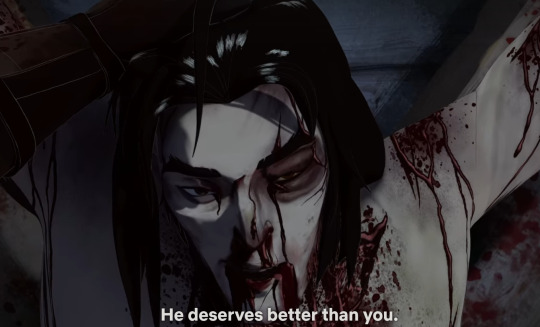
The trigger for his redemption is Mizu. If she had never beat him in that duel, Taigen would live on to become a man like Akemi's father. Cruel, power-hungry, controlling, conservative. But through Mizu, Taigen's sharp edges are ground down, much like water that wears down the stones in a river.
Where Mizu and Akemi's possible love story would be a clash of wills, full of passion and even heartbreak, a possible love story between Mizu and Taigen would be the wearing down of souls. Mizu would make Taigen a better person, and in turn Taigen would dedicate his full respect and support to Mizu as his equal, thus getting her to slowly open up and love herself. Already, Taigen has grown enough to admit (begrudgingly, and in his own Taigen way) that Mizu is better than him; though, clearly, he still has a long way to go, as he still calls Mizu a demon shortly after that.
But basically, Taigen is a very simple man (his main goal now is "to be happy"), and Mizu has great depths that he cannot yet fathom. For this love story to work, it has to begin with Taigen changing for the better. If he succeeds in that, and is able to accept Mizu for all her complexities, I believe that they will make a formidable pair. And though he'd likely still throw a jab or snarky remark at Mizu every now and then, I think he'd come tl wholeheartedly admire Mizu as a brilliant swordsman and a kind soul. Thus, should things work out and this be endgame, Taigen would be able to provide Mizu with what Mikio could not: an idyllic life that is not built on a lie, but mutual trust, respect, admiration, and equality.
Or hey, maybe they could both make their own dojo together! I don't know.
(Edit: This post by @rinandsketches does a great job at delving into Taigen's character and a potential Mizu/Taigen relationship if you'd like to read more about this angle!)
--
Now, as I move on from Taigen, there are a couple more options on how to resolve this love triangle and that includes Option C: Ringo.
In this option, Mizu does not have an endgame romance with either Akemi or Taigen. In this route, she finds peace and love through friendship, solidarity, and a found family between herself, Ringo and Master Eiji—a bunch of outcasts in society who make a strong trifecta of sword-makers.
Also, as an aside while I'm talking about Ringo, I'd like to point out that I believe his element is air and his colour is a neutral grey; he is talkative, easy-going, wise, curious, light on his feet (stealthy) and free-spirited, which are all traits linked to air, and traits that complement Mizu nicely, as he is capable of getting Mizu to open up and trust others again, while Mizu helps him reach his true potential for greatness.
--
And finally, there's Option D: Polyamory.
This is basically an "all of the above" option, in which everyone wins and it's a super duper happy ending. It would also be awesome to get some polyamorous representation, and seeing the dynamic between Akemi/Mizu/Taigen play out would be very entertaining and refreshing. So, you never know, this just might be the true endgame!
--
AAAAND with that, I close my extremely long analysis of what is essentially Mizu's love life. Whatever the final outcome of this love triangle though, I just hope it will be well-written and satisfying to all the characters' respective arcs. (Also I just want Mizu to be HAPPY goddamn it because she deserves the world and her coochie eaten out)
Now, I highly doubt anyone will read any of this (especially not until the end!) but that's fine. I just have so many thoughts and feelings about this show and I just needed to get this out of my system lol! But if by some miracle you did read this far, I wholeheartedly welcome any sharing of thoughts and ideas because man am I obsessed with this show! But of course, if we have an opposing opinions, please be respectful when letting me know; I am very open to friendly discussions.
#blue eye samurai#mizu x taigen#mizu x akemi#mizu blue eye samurai#mizu x akemi x taigen#blue eye samurai meta#also if you ask me PERSONALLY. based on my own analysis which you can read above. personally i'm placing my bets on option b (mizutaigen)#and this is simply bcs i think mizu deserves nice things and that includes getting dicked down and pampered and worshipped#whoops who said that#also mizu deserves to live a life where she can hand taigen's ass to him on a daily basis. ykwim.#BUT i am def open to a change of opinion regarding the mizuakemi rship as the story progresses#i just dont want the writers to reduce akemi into nothing but a love interest for mizu#the only way i can see a happy mizuakemi endgame scenario is if blue eye samurai becomes purely an angsty romance story#in which case then yes i fully endorse the akemi ending <3#but that would probs require a whole genre overhaul? bcs currently the show is firstly an action-epic where the romance is just a subplot#but even tho i dont reeeeally want a mizuakemi endgame i still DEF want mizu & akemi to be romantically and/or sexually involved plsss <3#like they cant have that slow-mo shot between the two of them as their first encounter and NOT DO ANYTHING W IT!!!#also i want mizu to be at LEAST a little sapphic plsplspls#shut up haydar#meta dissertations.pdf#haydar's fandom posts#i wrote this whole thing while delirious and covid positive
357 notes
·
View notes
Note
I was wondering, what do u think Taigen reaction to finding out about Mizu being a woman will be?
Although I don’t think he will have a bad reaction I wanted to know what u thought about it?
OOH I like this question because the thoughts on this have been swirling around in my brain for a while and I don't think I ever properly talked about this, outside of maybe this post (which is barely coherent imo). There, I compared Mizu/Taigen to Mizu/Mikio, as well as to the main romantic couple in the movie Yentl. Then from both those comparisons, I tried to speculate on Taigen's reaction to Mizu's gender reveal, based on what would make the most narrative sense.
However, I didn't really analyse Taigen himself in that post, and neither did I ever come up with a concrete conclusion to what his reaction may be. So this ask gives me a good chance to speculate even further and hopefully come up with a proper and more in-depth answer.
Similar to you, anon, I don't think Taigen will have a bad reaction per se, though I guess it depends on what you'd define by bad.
Because this is Taigen we're talking about, I don't think he'd exactly be chill about it. He's very much a drama queen, especially around Mizu, as he's never afraid of stepping on her toes, and thus will vocalise his feelings to her whenever he's feeling them. That, combined with his short temper and his brashness, means that there's almost certainly going to be conflict when he finds out the truth. He will be shocked, and because he's immature, he'll be angry and upset because of this shock. Simply because he doesn't know, and hasn't yet learned, how to deal with his emotions in any other way besides getting angry.
So I think that will definitely be his first instinct. To get upset.
I don't think he'd immediately know why he's upset. Maybe only after a few minutes of angry questioning (think something along the lines of "Why are you telling me this now?!" and "You've been hiding this all this time?!"), he'd finally come up with some tangible cause for his anger.
What would the cause for his anger be then? Well, it could be several things.
Possible Reason #1
He feels "betrayed" because Mizu didn't trust him enough with the truth even after the two have grown close, and after Taigen has put his life on the line for her numerous times.
Possible Reason #2
He feels "cheated" because Mizu is not the man he'd believed she was, thus making it feel like their entire friendship was a sham. This is because the basis for their relationship, in the way he'd related to her, bullied her, envied her, admired her, allied himself with her, and eventually grown attracted to her, had been entirely based off the premise and belief that Mizu is his fellow man, his peer, comrade, and fellow samurai. Thus, discovering that Mizu is not a man would, initially, feel like all of that has been ripped away from him. And this is actually related to the third possible reason.
Possible Reason #3
This is a big one, and the reason everyone, including myself, is putting their bets on: misogyny.
Essentially, Taigen would find out that this whole time, the person he'd been envious of and struggling to beat in every single fight, is not a man, but a woman. And as far as he knows, even if women in feudal Japan could once be warriors (see: the Onna-musha), perceptions have since changed by the time of the Edo period. Furthermore, even if women could fight, men were still expected to be stronger, because men are supposed to protect women.
However, I believe that Taigen's particular flavour of misogyny is a little different, in that he does not view women as "inferior." Because remember, his fiancee was Akemi. This was a woman who took no shits! She was snarky and playful and intelligent, and moreover she was a princess, superior to him in every way, and he knew and respected all of that, and respected her as an individual who could make her own choices. When she'd told him the news of their engagement, Taigen asked her, "He's [your father] sure? You're sure?" And then, when she tried to seduce him in Ep 2, he asked her, "Akemi, are you sure?"
His respect for her is the only reason why Akemi had been so desperate to marry him in the first place. She did not love him, but knew he would be good to her. Because she could not guarantee that any other man would treat her nicely as he would.
Thus, with that being said, I don't think Taigen is some "alpha male dudebro" who thinks women belong in the kitchen etc. Instead, I think Taigen simply believes women are just... different from men. So it's not that women can't or shouldn't fight, it's that they just don't. It's not that women can't or shouldn't be friends with men on equal footing, it's just that they aren't. You get what I'm saying?
It's like, imagine your whole life, you're told, and fully led to believe, that a lamp can't light up. They're just meant to be in your house as decoration. And then suddenly, you find out that your lamp lights up! And you're like, "OMG a lamp is lighting up! How is it doing that?! I thought light only comes from candles and the sun! This can't be right, I thought lamps never light up! Isn't that a fundamental part of their design?"
Now, put aside that this is a pretty bad analogy because it's 1am as I'm writing this and I can't think of a better one atm, but I hope the point comes across, in that this is clear-cut misogyny (I'm comparing women to a piece of furniture here on purpose), but the lucky thing about this particular flavour of misogyny is that it's rooted in ignorance, and is not inherently malicious. It can be, but it isn't necessarily.
Ignorance can be undone through learning and educating oneself. And luckily for us, my friends, educating oneself out of ignorance is the entire point of Taigen's character! He represents the uneducated masses who blindly follow the flow of the fucked up system. This is in contrast to Mizu who has never had a place within the system to begin with, Akemi who has spent her whole life struggling to go against the grain of the system, and Ringo who has always tried to follow the system, but due to his disability, is denied full access to it.
Thus, we've already seen him take the first steps to unlearn his xenophobic and racial prejudice, and we've also seen him start shedding his massive ego and desire for glory, which are both used to mask his own insecurities. If Netflix gives us all 4 planned seasons, then we have 3 more seasons for Taigen to fully grow out these backwards mindsets and finally reach his full potential to become—not a good man—but a great one.
THEREFORE, whatever the reason for his upset at discovering Mizu's gender, I firmly believe that Taigen will get over himself in the end, regardless of whether his anger stemmed from his misogyny, hurt, confusion, or whatever else.
Because Taigen's short temper and emotional immaturity is born from him spending his whole life on the move. Unlike Mizu, who is always alone with her thoughts and meditates constantly to try to cleanse herself of her restless emotions, Taigen is used to surrounding himself with people (see:him in the Shindo Dojo) and ignoring his emotions completely (see:him trying to forget Kohama). Which is why, when he does feel anything, it's overwhelming, and he doesn't know what else to do with it except let it out, usually in an angry outburst. Only when given the proper chance to reflect in Kohama in Ep7, does Taigen finally go through some substantial growth and start feeling remorse over how he'd treated Mizu.
Hence, I suspect something similar will happen when he discovers Mizu's gender, in which he will get upset and shocked and confused first, but then he'll reflect and regret and try to make up for his past behaviour.
And this is what I meant earlier when I said that I don't think he'll 't have a "bad reaction."
Essentially, it is my belief that his reaction will not follow in the footsteps of Mikio's, but instead, directly oppose and subvert that. This is related to the points I referenced in the post I linked above, but also, more importantly, because Taigen and Mikio are narrative foils.
Thus, where Mikio had betrayed Mizu and left her for dead, I believe Taigen will, at the end of the day, remain loyal and continue to fight by her side until the very end.
Because the thing about Taigen, as a person, outside of all the attitudes and prejudices that have been ingrained into him, is his relentless devotion. He gives himself into everything he does, puts in his all, and does not do things halfway. That's what makes him such a good soldier. He does not lead, but follows. He is inherently self-sacrificing and driven by a desire to protect, and we see this in how protective he is of Mizu to the point of enduring torture for her and telling her to use him as a human shield; how his first instinct upon hearing Akemi had been dragged off to get married against her will, is to get up and try to go to her; and how, when hearing the shogunate is in danger, he immediately goes straight to Edo palace to try to warn the shogun, even if it might get him killed in the process.
I could go on about why I think this is what makes him so good for Mizu (because Mizu's arc, especially in Season 1, is literally about accepting help and opening herself up to others) but this post is already atrociously long, so I'll just leave it at that.
So, anon, I hope I answered your question! I'm sorry I can never give short answers though, but I think at this point, it's to be expected from me lol. Thank you for the ask btw! And on that note, my inbox is always open for more 👀
#blue eye samurai meta#taigen blue eye samurai#taigen x mizu#mizu x taigen#taimizu#letters.doc#meta dissertations.pdf#<- i have a new tagging system for my fandom posts! the rest are listed in my pinned <3#anon#blue eye samurai#fandom.rtf
87 notes
·
View notes
Text
Blue Eye Samurai & Themes of Breaking Free from Binaries and Boxes
Mizu must choose between being a woman or a man, between feminine and masculine.
Mizu must choose between being Japanese or white.
Mizu must choose between being human (loving) or demon (hateful).
Mizu has struggled against the chains placed upon her since birth, but no matter how much she writhes and pushes against them, the chains remain. And they will continue to, until she learns to accept all of those facets of herself and suppress none of it.
Mizu must realise that she is both feminine and masculine; Japanese and white; human and demon. Mizu is all of these things and everything in between and at the same time she is none of them. She is simply Mizu. Only upon accepting this can she slice through the chains and find freedom.
But Mizu isn't the only one faced with these stifling binaries and predetermined paths. Each of the main four characters represent this theme as well.
"This is the world. It grants women a fixed number of paths. Proper wife or improper whore." -Seki, to Akemi
Akemi, as a woman, must choose between being a wife (modest, meek, but rich) or whore (sexually liberated, willful, but exploited). Both of these would amount to defeat, both of these are cages. So what does she do? With the cards she's been dealt and the rules outlined for her, she decides to change the game so she can win, manipulating her husband (and father, who is now under her care) to give herself the advantage. This way, she blazes her own path ahead to achieve power for herself.
"As it says, there are four paths through the world. The way of the farmer, the artisan, the merchant, and the warrior. Each of these can lead to greatness. I never even cared which path, so long as I found mine." [...] "I know I can't touch greatness any more than I can swallow the sun. But, I can help. I can help greatness." -Ringo
Ringo, partially due to his disability, faces barriers succeeding any of the predetermined paths set out for him, but freely moves between each one in search of one that can lead him to greatness. However, upon meeting Mizu, his horizons expand. Now, he forges his own path, deciding to rise beyond a quest for his own greatness, choosing to instead to help greatness. This is similar to the role teachers take. Teachers do not get to be rich or successful or written into history books, but they help, teach, and inspire others so that they can rise up to their fullest potentials.
"Eighty-four thousand Dharma doors. For me, there were only two. The net or the sword. I could become my father, or I could cut my way free of the net." -Taigen
Taigen, born and raised impoverished, had only two options to survive. He could either be a fisherman and remain poor, or he could strive to work hard as a swordsman in the hopes to one day escape poverty. To him, it was a choice between a life of suffering or a chance at glory. Either way, the chances of dying (from either starvation or getting killed) were present, so obviously he'd taken the chance to run away and try his hand at greatness. But then, he lost his honour, and thus lost everything. Now his only choices are to regain his honour or simply kill himself. He tries the former, but upon bonding with Mizu and Ringo, he finds out there is more to life, that there is a third option open for him he'd never realised before: happiness. Rather than just mere survival, or toiling for material gain, he realises that life is about living.
Overall, the story is very multifaceted through its exploration of societal expectations and norms, and how people are forced to conform, but also the ways they can break free from those boxes.
And in my opinion each of the characters represent differing aspects of marginality, and can be analysed from differing perspectives.
Akemi's story is a predominantly feminist narrative about the marginalisation of women.
Ringo's story is a predominantly disabled narrative about the marginalisation of disabled folks.
Taigen's backstory is a Marxist narrative about the marginalisation of the poor and working class.
Mizu's story is most prominently a postcolonial narrative about the marginalisation of racial Others, ethnic minorities, and hybridised identities. However, as the protagonist, Mizu's story is the most multilayered and thus also heavily features feminist, queer, and Marxist themes due to her complex relationship with gender as well as her background as an orphan living on the streets.
I just found it very interesting that, altogether, the four main protagonists each represent groups that are fighting against an unjust system.
Even Takayoshi, son of the shogun, who should thus be one of Japan's most powerful men himself, is instead seemingly powerless as he is silenced and manipulated by his own mother due to his disability—his stutter.
I also find that these themes of breaking free from conformity and expectations are very interestingly displayed in Taigen, who had thought he'd found a way to join those unjust systems and play by all its rules, and by doing so he had played the role of antagonist. Because one of the central conflicts of the show is Man Vs Society, in which society is the antagonist and the man is Mizu, among others. So by becoming one with that cruel society, Taigen in turn also becomes Mizu's antagonist. Only when he is stripped of everything, all his years of struggle immediately stomped into the dirt as soon as he loses a single duel, only then does he shift away from his antagonistic role. Disgraced and dishonoured, he, too, now rejoins the margins of society, becoming an outcast alongside Mizu and Ringo.
So, TL;DR the society and world portrayed in Blue Eye Samurai is shitty for pretty much everyone unless you're a rich, corrupt, able-bodied cis man. Thus, essentially no one is free and everyone is restricted into neat little boxes where they play their roles and stay in line while the rich and powerful benefit. But Mizu, Akemi, Ringo and Taigen challenge this, and slowly they will rip the boxes go shreds—choosing what they want, and what they want to be, for themselves.
#blue eye samurai#mizu blue eye samurai#taigen blue eye samurai#blue eye samurai meta#akemi blue eye samurai#ringo blue eye samurai#also all of four of them are mistreated by a parent to varying degrees. for ringo taigen & akemi it's their dads. for mizu it was her mama.#plus mizu's dad is believed to have assaulted her mom so.#they all have parental trauma lmao.....#the more i think about this show i go crazy#scheduling this post#shut up haydar#meta dissertations.pdf#mizu is non binary in every way !!!!#she just like me fr !!!!#fandom.rtf
83 notes
·
View notes
Text
taigen dying out of some noble sacrifice simply wouldn't make narrative sense because the man has offered to kill himself like a million times already. if he's going to sacrifice himself for mizu and die to atone it wouldn't mean anything because he's already almost done that over and over again. literally endured torture and had his fingernails ripped out one by one for her, and STILL stood between her and fowler to let himself get almost beaten to death.
the biggest atonement for taigen lies not in death but in living, in dedicating his entire life not to himself or his own goals, but to mizu and hers.
"taigen wants to settle down and that's not compatible with mizu's quest for vengeance"
taigen WANTS to settle down, is the key point here. he CAN'T however. he might TRY, but he won't be ABLE TO. he will thus not slip away to settle down and be a fisherman and simply leave the narrative all of a sudden, because he's already knee deep in it (it being the narrative), and has been since the moment mizu was living in kohama in that little hut at the edge of the woods.
mizu still owes him his duel, and he still owes mizu his life. and when i say taigen owes her his life, again, i do not mean he needs to die for her. he needs to live for her. mizu has to be his very purpose for breathing. protecting her has to be woven into the fibers of his being. do you understand me. is this thing on. hello
68 notes
·
View notes
Text
BRB thinking thoughts about Taigen's character, the TaiMizu ship, and a big chunk of fandom's perceptions regarding both those things.
(Inspired by @farintonorth's post related to this topic that just got my brain going brrrrr)
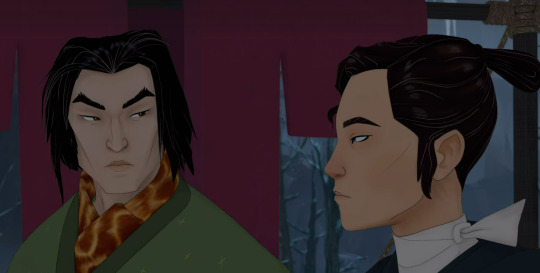
OK so let me just... start off by saying that I think that reducing stories to their tropes is seriously detrimental to the way some people are interacting with fiction, and while that honestly warrants its own post about the subject, I wanna talk specifically about how this affects the way some people in the fandom talk about Taigen and TaiMizu.
Because yeah, tropes are useful shorthand to refer to certain dynamics or archetypes etc, and they are indeed the building blocks to any story. But in a well-written story, characters and their relationships, actions, and motivations, are much more complex than just tropes. Because in a story that has characters who are more than just cardboard cutouts, their behaviours, backgrounds, motivations and all of that, are inseparable from the context of the overall story they exist in.
So like, sure, you can say Mizu and Taigen have an enemies-to-lovers or rivals-to-lovers dynamic. I also use those terms because it's easier. But I also think this is where things start to get a bit twisted, especially from an intertextual sense. Because "enemies-to-lovers" is also commonly used to refer to other ships in other media, whereby it tends to be rooted in an imbalanced power dynamic, such as oppressor-oppressed and bully-victim.
And while that's a whole can of worms that I won't be getting into because it can quickly derail into a whole separate sort of fandom discourse, I'd just like to make it clear that Mizu and Taigen, in particular, do not have an imbalanced power dynamic. They are not bully-victim or oppressor-oppressed. The only understandable reason why someone might actually think their relationship is imbalanced is if
A) they only watched the first episode, or
B) they cannot grasp the slightest bit of nuance in a character, or
C) they're being obtuse on purpose simply because the Mizu/Taigen relationship, or Taigen's character in general, just doesn't suit their tastes.
While yes, Taigen, along with his whole gang, had bullied Mizu when they were children, that dynamic does not exist between them whatsoever in adulthood. Whatever imbalanced bully-victim power dynamic that had once existed between them was decisively ripped apart the moment Mizu beat him in that duel in the dojo, and then completely obliterated by the end of the season.
Mizu is not a defenseless victim at Taigen's mercy. Mizu can beat Taigen's ass any time she wants (and she DOES, repeatedly in fact), and could even kill him if she felt like it. She taunts him openly and without fear ("I like your hair"; "I can beat you with any weapon you choose") and all he does is bark back, because that's pretty much all Taigen ever does. Time and time again, he yaps about how much he wants to kill her, but time and time again, his actions prove that all of it is just an empty threat. Because though his words say "I hate you", his actions demonstrate the complete opposite. He's shown how protective he is of Mizu, how unhesitatingly he sacrifices himself up for her, how loyal he is in enduring days-long torture to not give up information about her, how even when near-death and in pain, he's still willing to keep standing back up so he can fight by her side and help her win against her enemies.
And Mizu is not an idiot! She sees that too. She does not see him as a threat, an enemy, or even a bully. Especially not by the end of Episode 3, and definitely not by the end of the season. When she finds him in the dungeon in Episode 6, she smiles from relief, and doesn't think twice to take him with her. Mizu finds him, at best, an annoyance, or at worst, an infuriating hindrance on her quest for vengeance. Which is why, when Taigen is about to say, "It's a shame our duel's set for tomorrow; I have to kill you before you get your revenge," Mizu whacks him on the head without a second thought before he can even finish his sentence, and leaves him lying unconscious, face-down, in the snow.
And this further emphasises how he does not hold any power over her. There is no abusive power dynamic between them. She is more powerful than him, he knows this, and all he's ever done after they've met up again in adulthood is get his ass whooped by her, get mad about it and pester her and follow her around, get his ass whooped by her some more, and put his life on the line to protect her.
"OOoooOOoooH b-but he called her a demon at the end of Episode 7 and threatened to kill her again!!!" Oh my god. He called her that because he's calling her out on her selfishness to stay silent about her knowledge of Fowler's plans to attack Edo. Because to him, loyalty and honour as a samurai is more important than anything. So in his own brash-and-immature Taigen way, he felt betrayed that Mizu did not hold the same principles. That's why he got angry. He wasn't even that mad about letting Akemi get dragged off by the Tokunobu guards. It was about saving the Shogun and the Shogunate as a whole. That's why the first thing he does in Edo is not find Akemi, but try to warn the Shogun about Fowler's attack.
Look, I'm not defending his stupid ass, of course. Because calling her a demon especially after their cute little wrestling time was obviously rude and inappropriate, especially since words like "demon", "monster" and "Onryo" have had such a deep effect on Mizu throughout her life, and continue to contribute to her self-hatred. But like? That's the fun of realistic and flawed characters, and realistic and flawed relationships. They're not perfect, and it's why we as an audience root for them, wanting to see them work through their shit and find a way to prevail despite it all.
Also, him saying that was in the heat of the moment. He was angry, he felt like his initial belief of who Mizu was—a strong and loyal samurai, just like him—was shattered, and so he lashed out. Was it rude? Definitely. Was it immature of him? Yes, incredibly. But it's also very much in line with his character, because even though he's grown a lot over the course of the season, the show isn't over yet, so obviously his character arc is just beginning, as that is also the case for the other three main characters: Mizu is beginning to accept herself, Akemi is beginning to grow into her position of power, Ringo beginning to train under Master Eiji, while Taigen is beginning to simply be a better person.
On that note, when speaking of Taigen's immaturity, I think that's also one of the main things that people tend to gloss over when it comes to his character. Because when you boil everything down to its bare essentials, Taigen is, essentially, a boy. I've talked about this before, but to reiterate, Taigen very much behaves like an unhealed child. Even as an adult, he is insecure, prone to throwing tantrums, and is desperate to latch onto some material goal in hopes that it will make him feel better—initially he was chasing status/glory/greatness, and then when Mizu tells him that "Nothing comes from being a samurai but death," he immediately decides he wants to run away with Akemi in hopes that he will be happy.
And it's a big step, acknowledging that he doesn't truly want greatness, but had always just assumed it was his only path to a good life. But it's clear he still hasn't really figured it out. Because if he did run off with Akemi to get married and live in the countryside, he still wouldn't be happy. Because he still doesn't know who he really is, or what it is he really wants. Marriage at this moment is the last thing he needs, and as he is now, he would be a pretty awful husband. A simple life would be good for him, but would he be good at a simple life, when he still has so much he needs to work through?
So anyway, what I'm getting at here, is that he's trying and he is learning and growing. So yeah, he is flawed, but honestly? So is Mizu. And the funny thing is that they're flawed in very similar ways.
Because Mizu is also an unhealed child. That's why she's so angry all the time. That's why she pushes people away. That's why she, just like Taigen, is so happy when given the chance to playfully wrestle in the forge, laughing and rolling around like children without shame or pretense.
Again, this shows there is no imbalance between them. They had grown up together as peers from the same town. And while Taigen had had the upper hand back then, because he'd had a gang of other kids with him, that is definitely not the case anymore. Today, they are equally flawed, equally strong, equally skilled swordsmen, and equally bull-headed.
However, yes, Mizu is definitely leagues more mature than Taigen. But she still holds a lot of childhood wounds that mirror Taigen's own. And we see this especially in relation to her mother. Similar to Taigen who had an abusive and alcoholic father, Mizu's Mama was an opium addict and had hit her, berated her, had shaved her head without her consent as a child, and as an adult, had constantly emotionally manipulated and guilt-tripped her. Mizu's love for her Mama was what had driven her to a path of vengeance in the very beginning. And when she'd found out Mama was still alive, she had wanted nothing more than her Mama's love, and it was this alone that pushed her to agree to the marriage with Mikio in the first place. And now, knowing from Fowler that her birth mother is someone else entirely, is what makes her agree to keep him alive and haul his ass to London to seek answers.
Thus, integral to Mizu's self-hatred is also Mizu's intense longing for love and family. Just like Taigen, whose pompousness comes from his insecurity about being the son of a poor fisherman, Mizu's goals are also shaped by who her parents are. Remember, her vengeance is not against just anyone who's corrupt or evil, but specifically against the men who she believes had assaulted her mother, the men she believes had made her a monster, the men she believes had abandoned her to die and continue to try to kill her. Her vengeance is against a father, on behalf of a mother. In The Tale of the Ronin and the Bride, Mizu is not merely the Ronin, the Bride, or the Onryo, but also the Child.
This is also why Ringo is so good, not only for Mizu, but for Taigen as well. Ringo is wise and caring and considerate, but above all, he is in tune with his inner child in ways that Mizu and Taigen are not. He is always earnest and positive, he sees the world with childlike wonder, but is not naive or blind to its ugliness. His whole life has been a battle. Ringo brings out the best in Mizu, consistently acting as her moral compass and conscience, and Mizu's choice to save Akemi in the final episode is only because she promised Ringo that she would. Because it's the right thing to do. Ringo inspires her to be a better person, and to think outside of her narrow-minded goal of revenge. At the same time, Ringo also brings out the best in Taigen. While at first Taigen had looked down on both Mizu and Ringo ("Half-limb to a half-wit"), by the end of the season, he's proud to have Ringo as a friend and ally, he listens to Ringo's advice ("What would Master do?"), and asserts to the fucking Shogun that Ringo is a worthy warrior to have by his side.
Okay, I've gone on a bit of a tangent here, but my main point is that Mizu and Taigen are incredibly similar. They are equals. They are both flawed, unhealed children who are chasing some impossible outlandish goal in hopes that it will fill the void in their hearts. They also both have a long way to go in terms of character development if they were to ever build a healthy romantic relationship (either with each other, or even with anyone else). So while I believe things will be rocky (because duh, it's a story, we all live for the drama, etc), I think with Ringo's help, they'll get there eventually.
#blue eye samurai#blue eye samurai meta#mizu x taigen#taigen x mizu#taimizu#taigen blue eye samurai#mizu blue eye samurai#meta dissertations.pdf#im not a taigen defender. but i AM a taimizu truther#wank.mp3#sorta#fandom.rtf#shut up haydar#like i KNOW we all love mizu and want her for ourselves but cmon. let's be real here for a second.#ahem. hear ye! put down the delulu for a mere moment!#and ask thyself. why am i beefing with this pathetic bald man? a man who is the definition of a wet rat?#thus. my brother in nerd ass shit. i beg thee put down thy weapon. this man is not worth beefing with! he is literally... just some guy.#yes...he is bitchy. however! he is also a loser obsessed with mizu. remember this. he is not thine enemy. but simply...one of us.#also lmao like jokes aside lemme be clear. you ARE ALLOWED to hate taigen and taimizu all you like!!!! feel free to do so!!!!#but please just acknowledge it's like. a preference thing. like it's just not your cup of tea! thats A-OK!#but please dont insist that the ship is toxic unhealthy abusive etc#but if you still feel the need to do so. then for the love of god just tag your posts as anti-[insert whatever here] so it helps ppl mute#i knew how to tag shit as anti-makorra since i was fourteen! 😭 like it's basic courtesy cmon
96 notes
·
View notes
Text
the duality of mizu and taigen is what gets me so bad. not duality as in how contrasting they are as individuals. because as i've said before they're both incredibly similar actually; both their flaws are rooted in the way their self-hatred manifests by compelling them to behave cruelly to others. however their personalities and worldviews contrast; mizu is quiet/reserved and individualistic while taigen is loud/dramatic and collectivist.
but here in this specific context, what i'm referring to when i say "duality," is the duality inherent to their relationship and how they relate to one another and have this twisted hate-love with each other.
the way they both confuse love with violence. because violence is the only thing the both of them have ever known.
taigen's obsession to kill her is twisted with his attraction to her. his possessiveness over her death morphs into protectiveness.
mizu's first spark of desire for him ignites when he is actively aggressive, hitting her in her freshly-healed wounds.
they bond over a near-death experience in the chasm. they see themselves in each other through their shared passion for swordsmanship—their shared skill in taking lives. taigen sacrifices himself for her constantly and mizu saves him every time. they hate each other but wordlessly and effortlessly synchronise to fight against common enemies (okiyama the giant; the archers; fowler).
defence and violence; affection and aggression. for these two they might as well be the same thing. and looking at their childhoods you don't have to wonder why. both of them were abused as children. both of them have been fighting tooth-and-nail all their lives. all they've ever known is violence and cruelty, and learning to enact those things themselves so they can pave their way through the world, even if it leaves piles of dead behind them.
they both want softness though. they both want happiness. taigen says as much at the end of the season, and for mizu, it's an integral part of her entire arc of wanting peace, happiness, and love.
and again that's part of the duality i'm getting at. they're well trained killers, but they both just want a life of peace and joy. they're so bad for each other but they're perfect for each other. they hate each other but they love each other. they're an intrinsic part of each other's lives. dare i bring up the concept of a red string of fate? a string they both constantly gnaw on and wish to strangle each other with?
#the dynamic is that theyre both very fucked up and very not-normal#they can be soft with each other though. they can learn to be#taigen x mizu#taimizu#mizu x taigen#shut up haydar#fandom.rtf#meta dissertations.pdf
51 notes
·
View notes
Note
Hiii, I've got an ask for you 🫣
What is the most interesting end for Mizu in your opinion and if you could guess, what do you think the writers will do?
1. Doomed by the narrative all the way (her story starts sad and ends in a even bigger inevitable tragedy)
2.She gets what she wants but will never find true happiness (maybe lose someone she loves in the way)
3.Gets what she wants and finds contentment and even happiness.
Secret fourth opition?
Hope you are well😁
Hiiiii <3 <3
OOOH this is an interesting one, and right out the gate I would 100% immediately choose Option 3 here, which is that Mizu gets what she wants and finds happiness and contentment.
Now I am a SUCKER for tragedy and bittersweet endings, they are soooo juicy like don't get me wrong (the novel manuscript I'm working on is literally a doomed-by-the-narrative type story!) but in my opinion, though all stories can be tragedies, not all stories necessarily should be.
This is because a story's ending, and what makes an ending satisfactory, is heavily reliant on the promise that it sets at the very beginning.
A narrative promise is essentially what the story is telling us to expect when we start the first episode or read the first chapter or click the start button on a game. As such, the promise is usually given to us in two primary ways.
First is the story's tone. What sort of language does it use? What sort of art direction does it employ? Its music, its camera angles?
In BES, the story starts off with some dynamic long shots of Mizu walking with her back turned to the camera through the snow, the wind whooshing and dramatic music in the background, while words fade in and out on the screen:
In 1633, Japan closed its borders to the outside world. Citizens would never see a white face, nor any face that was not Japanese. A child born mixed race would be considered less than human. Pitiable. Monstrous. From these times rose a legend. Of a swordsman. Of a sword. Of revenge.
The music ends in an epic crescendo. Cue title screen.
From the above line, we can already see that the tone is that of a dramatic, epic, action-filled story about revenge. From that first scene, we see Mizu's confrontation with Hachi, and from this we already see the promise that this is a heavily-stylised action martial arts series that will be violent and gritty.
On that note, its fight sequences also follow video game logic a lot of times, and overallm a lot of things are not very realistic or necessarily 100% historically-accurate. This, together with a lot of casual dialogue and humour littered throughout, makes it a story that doesn't take itself too seriously. It's rather blockbuster-ish in that sense, and while very well written and rife with beautiful imagery, symbolism, and nuanced characters and themes, it is not intended to be high literary work by any means.
And while Mizu's backstory is indeed very tragic, the story we see in the present is very tonally different, chock-full of one liners and silly lines (thank you, Ringo and Taigen, my silly boys, for that) as well as flashy action scenes and montages set to rock music. The tonal shift between the past and present stories is also in part what makes The Tale of the Ronin and the Bride stand out so prominently among the 8 episodes.
Besides the tone, a story also delivers its the promise through its character arc, which is presented to the audience by showing us a variety of things related to the protagonist, such as:
what the character is missing in their life: for Mizu, it is love and acceptance;
their desires: revenge, because as we see from her backstory, she has been unable to obtain love/acceptance;
what's preventing them from achieving it: Mizu adamantly believes that she is a monster who is not capable of loving or being loved, and this is why she pushes Ringo and Taigen away in present day;
and their flaws: Mizu is stubborn, narrow-minded, and is driven purely by hate and anger. Taigen tells the viewers this very clearly in Ep7 when he says she's killing Fowler "Not for honour. For hate." And also in Ep8 when he says to Ringo, "Mizu doesn't care about anyone but himself and his revenge." Mizu's "ember" is her anger and desire for vengeance.
Thus, from all this, we can come to a conclusion that the show's promise is something along the lines of
Mizu gets her revenge +
Mizu unlearns her self-hatred and stops letting her anger be the only thing guiding her +
Mizu stops running from people who care about her so she can finally get the love and acceptance she's always craved.
IMO, only by fulfilling all three of these promises would the story have a satisfying payoff.
Whether the revenge will be directed to the white men, though, is up for debate, as there are a lot of theories going around that maybe the white men aren't as evil as she thought and none of them are even her fathers, that Mizu's true enemy is Lady Itoh and the shogunate, etc. The third point, regarding love and acceptance, is also a point of discourse, because we don't know who she'll end up with, or if she'll end up with anyone romantically at all, whereby the story opts to make it an open ending focusing on platonic/found-family bonds rather than any romantic one.
Whatever the case, it doesn't necessarily matter, and I'm open to pretty much all directions the writers may take us as long as SOME revenge is achieved, blood is spilled, colonisers get their dues, AND Mizu gets to be loved and happy.
BUT if you ask me for my ideal version of that payoff... I think it's no surprise to anyone when I say I want Mizu to live a nice peaceful and secluded life, in which all her past adventures fade into myth and legend (as implied in the opening text).
Because while I'm almost certain Mizu is related to some royal or important bloodline, I don't think Mizu would find happiness in a life in the palace. She has never wanted greatness, has never even hinted at wanting power or anything like it. She craves belonging and the freedom to be herself, and to be loved for all her flaws and dualities. These are things she needs to grow and be a better person as well. A life of politics and intrigue inherent in being a royal heir, or in being a samurai loyal to the shogunate (even if it is under Akemi's future administration) would offer no such freedom or sense of peace for Mizu.
So yeah! Peace and quiet and happiness, maybe living on a farm like she did with Mikio. But of course that life wouldn't mean anything if she were to live it alone, because remember she wants and needs love and belonging. As such, I think the one most suited to give her that would be Taigen (for a variety of reasons).
This life could be with or without their bestie Ringo, depending on if Ringo decides to travel and find his own greatness, and it is implied that Ringo does leave Mizu's side to go on his own adventures, as hinted by the creators wanting a spin-off centered around him.
And also Mizu and Taigen go to visit their mutual ex-girlfriend Akemi sometimes for like special occasions or something.
I hope that answered your question, and thank you so much for the ask!! <3 <3 And on that note, my inbox is open for more if anyone else would like to pick my brain about this show, or anything else for that matter really. I may take a while to answer them considering how in-depth I like to go on these, but I love getting any and all these asks regardless :)
#blue eye samurai#blue eye samurai meta#taimizu#mizu x taigen#taigen x mizu#letters.doc#farintonorth#meta dissertations.pdf#fandom.rtf
38 notes
·
View notes
Note
Probably you have spoken about it earlier (sorry if so), but how do you think that Taigen will know Mizu's gender in the series? And how would you like it to happen? I would like it to be intentional, but regarding the amount of wounds Mizu constantly have, who knows...
Hello! :D And no I don't think I've ever written about it publicly on this blog, and to be honest I've never thought much about it.
To preface, I've not always been the type to properly sit down and theorise about future narrative decisions. When it comes to these things, I'm very "big picture" oriented, where I'd usually be fine with anything happening in the story as long as it touches on certain themes, remains in character, and adds something meaningful to our protagonists' arcs.
For example the only reason I came up with the Mizu's mom theory was because knowing exactly who Mizu's mother is (whether she is white, or royalty, or anything else), could, depending on the different posible outcomes, drastically alter Mizu's sense of identity and how she perceives herself, as well as morph the core themes and message of the overall story.
On the other hand, when it comes to the particulars of the inevitable gender reveal, I'm not picky at all, and I'm open to all the possibilities of how it would play out. This is because the outcome to all of it remains the same (in which Taigen finds out Mizu's gender), with only the process to get there differing, and in that regard, the question is then mostly on personal preference on tropes and avoiding cliches, and speculating future plot beats that would allow the gender reveal to happen in the first place.
Like you said, it could happen by way of Taigen trying to stitch Mizu up while she's unconscious or at least half-conscious, which would thus likely involve a big battle happening prior. A similar instance that comes to mind is Mizu's face off with Chiaki and the Four Fangs; iirc it's the only time Mizu is unconscious and vulnerable in front of Taigen. I'm not counting the time after they both fell out from Shindo and Fowler's fortress, because in that case, they'd both been completely KO'd. So anyway yeah, to get back on track, post-Four Fangs battle, if Ringo was not a factor, Taigen would've likely been the one to bring Mizu to safety and patch her up. From the framing of the scene, and Taigen's expression upon noticing Mizu look so vulnerable (because at this point he'd still believed Mizu to be nigh invincible, as we see from his daydream of him battling a giant Onryo in Episode 2), it's almost like the show was teasing us with the possibility of a gender reveal right there and then. But then of course, Ringo comes in and puts a stop to that happening (and thank God for that, because neither Taigen nor Mizu, on a narrative level, are ready for such a reveal yet).
Other than a Taigen-patching-Mizu-up scenario though, and outside of Mizu confessing to the truth herself, another possibility is that Taigen deduces the truth on his own. And this an idea that Ioana (@saessenach) and I were discussing, assuming a scenario where Taigen did not follow Mizu on the boat to London, but remains in Japan to do his own thing. In this scenario, all four of our protagonists are separated throughout Season 2 to have their own arcs: Mizu in London, Akemi in Edo, Ringo in Eiji's forge, and Taigen? Well, absolutely zero hints were given on where Taigen's going to go after S1, so everything's up in the air. The reason for this could be just some network/authorial reason whereby the writers are leaving it open because they themselves aren't sure what to do with Taigen.
Or, if they'd pre-planned everything early on, the complete lack of Taigen's presence at the end of the finale could itself be an indicator of where Taigen, and his arc, are going. What I mean is, Taigen in Season 2 might be a Wanderer, also known as a Ronin. Remember, he was disgraced and cast aside by his Lord, has lost his station and place in his Dojo, and him witnessing the "humiliating" death of the Shogun could be reason for Lady Itoh to want Taigen gone. He has nowhere to go. Plus, with him beginning on a journey of unlearning his prejudice and confronting his wrongdoings so he can properly change for the better (with the scene of him in Kohama in Ep7 being only his first steps), it's possible that his arc next season will be something along the lines of Zuko's from Zuko Alone in A:TLA. If you haven't watched A:TLA, what I'm referring to basically involves going from village to village, seeing that the status quo and society is cruel and unjust, trying to help people but having it kinda blow up in your face because of the fucked up status quo, and also facing the past you've been running from your whole life (through the form of flashbacks and introspection).
Thus, should a Taigen Alone arc really happen, it's possible that Taigen also gets wrapped up in some plot involving the black market dealers in these towns he visits, which would help tie in to the main story happening with Mizu and Akemi, because the white men (on Mizu's end) and the corrupt officials in the palace (on Akemi's end) both have ties to such black market dealers that Taigen may encounter. So it's possible that while investigating these people and tracking them down, Taigen gets wind of some rumours about the huge bounty on a half-breed blue-eyed girl. And, well, you can guess where it goes from there. Taigen deduces the truth, and when he reunites with Mizu later on, there'd be all this tension because now he knows. And this would be a very interesting outcome because this scenario wouldn't lend itself to a huge heat-of-the-moment argument that everyone's expecting, whereby Taigen finds out the truth while Mizu's right in front of him. Instead, in this case, Taigen finds out on his own, gets time to stew in the revelation, and likely drive himself mad in the process, and BOY THAT'D BE JUICY AS ALL HELL!
So basically, yeah, between the two scenarios I just presented, I'd favour the latter more, but I wouldn't mind the former either, or anything else the writers might throw our way.
However, I do still kind of hope Mizu could be the one to reveal the truth to Taigen herself, as I feel she should be allowed the choice in the matter, rather than having Taigen find out against her will. Plus, being the one to tell him herself would be such a huge step for her, signifying how she's opening up to people again, and would also be a big sign of some pre-established trust in their relationship.
BUT like I said, I'm not all too picky, and I also live for the drama, so, in conclusion: ¯\_(ツ)_/¯
Also I just realised just how much I typed up, and I'm so sorry that I can never be concise with my words, but I hope it's still somewhat legible. 😭 Thank you so much for this question by the way! I love rambling about this show, and I'm grateful for any chance to ramble about it even more <3 <3
#letters.doc#mbiterna#blue eye samurai#blue eye samurai theory#taigen blue eye samurai#mizu blue eye samurai#for real though thank you i love getting asks that pick my brain about this show (or about anything in general tbh)#let this be a sign for anyone to come into my ask box and pick my brain#meta dissertations.pdf#kind of?#fandom.rtf
40 notes
·
View notes
Text
blue eye samurai's themes of racial/cultural hybridity is so ingrained into its narrative that it's even prevalent in the way the story is told.
it's set in edo japan but the character design of its protagonist, mizu, is inspired by western cowboys like clint eastwood. cowboys are also its own subculture in a way in modern japan, as many japanese people today are nerds about westerns and the wild west the same way americans today are nerds about anime and japanese culture.
the story is steeped in historical and cultural setting of japan in the 1600s, full of nuances and details* to reflect that, yet its script is originally written and dubbed entirely in english, which is why the dialogue and speech and mannerisms match how americans talk and not how japanese people talk.
* in regards to the historical detail, i am ignoring the historical inaccuracies present in the show for the sake of this post because it's not entirely relevant. though i guess you could also say that it's a hollywood-ification of a foreign culture. but it's not like japanese cinema and media depicting other cultures are very faithful and accurate representations either.
even the medium and genre itself. it's an animated show based in japan with japanese characters, but it's not a japanese anime. its inspired by japanese films like lady snowblood, but also by american films inspired by japanese films, like kill bill.
like. it's japanese but it's also so intrinsically american. it's fascinating.
#also crazy cuz usamerica and japan are both imperialist states lmfaoooooooo. this is not very relevant either. but i found it funny.#blue eye samurai#blue eye samurai meta#mizu blue eye samurai#this not a comprehensive analysis in any way but. it's just been floating in my mind.#this post has been sitting in my drafts for a while & i'm too lazy to add more to it. it's time to release it into the wild....#meta dissertations.pdf#fandom.rtf#shut up haydar
51 notes
·
View notes
Text
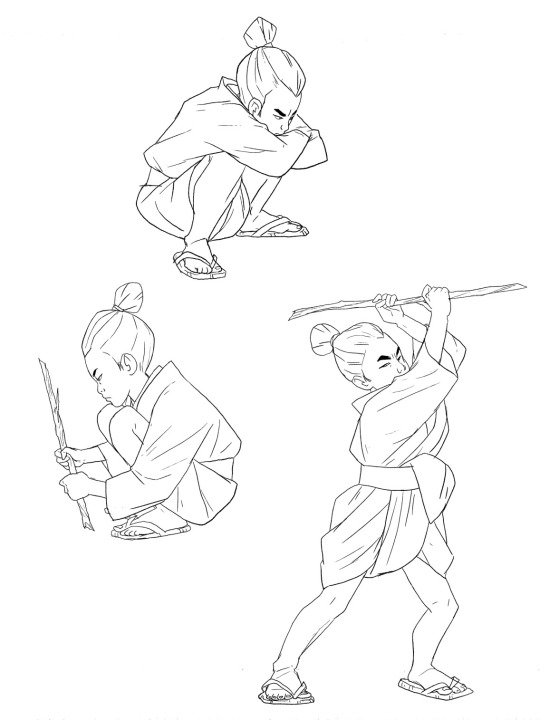
(concept art of young taigen - source ; art credit: @abigaillarson)
i cannot get over this concept art of young taigen. god.
just look at this angry bratty boy, too many feelings that he doesnt know what to do with! an abused 9 year old kid in poverty always playing with sticks in the dirt, obsessed with greatness and dreaming to escape his decrepit village—and he does!
he does escape. he runs away. this angry little boy, all claws and teeth and biting words uttered with a lisp, going on the run into a world he's never seen before until he makes his way to kyoto. and knowing him he probably forced his way in to be accepted by the dojo, growling and kicking even as he's thrown out, back into the streets, too stubborn to take no for an answer and never knowing when to give up.
taigen calls mizu a dog, weak, an orphan, a scrawny street urchin. but i can't help but think that he feels so bold to use those words because he had them spat at him too.
because taigen had the idea of "this is how the world is" beat into him from birth. he learned quickly that if you couldn't beat the world you could join it. but that meant losing your way, your values, your principles. and isn't that what true honour is? not just titles and status and glory?
we don't get to see what taigen, as a child surrounded by peers encouraging and goading him on, would've actually done if that meteor hadn't fallen right in front of them at that very moment. would he have really tried to throw that stone on mizu, killing her? we don't know.
but we do see what taigen (his true self, with no one around) does, when presented with the same opportunity. when mizu passes out in front of him, unconscious and near death, vulnerable, the path to restoring his honour lays itself out for him on a silver platter. and he wants to take it, wants to kill mizu, to claim what is his and return to kyoto and get back everything he'd worked tooth and nail for. he feels like it's what he should do. but he doesn't.
and later, again he is presented with the chance to betray mizu, likely offered by heiji shindo to get his rank reinstated within the shindo dojo. and again, taigen doesn't take it. he refuses. "stupidly loyal," fowler calls him later. loyal, like a dog.
because now, pulled away from the sneering looks and jeering words of people around him, telling him that this is what the world is, taigen had met ringo and mizu, two outcasts who refuse to follow a predetermined path to greatness. and so inside something blooms in him. something like hope. a chance to live in a world that doesn't kick you down every chance it gets, to live in a world where genuine kindness and and love and friendship and even weakness is possible, allowed to simply exist without fear.
because he'd been running away from the very idea of it the whole time. when he ran from kohama, he never looked back, never wanted to remember what it was like to be a child, afraid and hungry and angry and hurting, without the words to make sense of it, desperately wishing for something. something more. he doesn't know what. but he hears stories of great swordsmen and decides, yes, this must be it. this is what i want: glory, greatness. the twisted seed gets planted and thrives in this barren land.
and when he returns to kohama with mizu and ringo, he at last is forced to stop running. he must face the child within him again, and he tells that child to put down the stones in his hand, tells him to stop barking at anything that moves or looks at him wrong.
the child drops the stone, and taigen buys dumplings instead, gives them to mizu. the child within him, wide-eyed at the prospect of friendship, moves him to pick up a hammer and toss it to mizu. he's smiling inside even as he does it; giggling like a kid hiding a silly prank. as soon as mizu drops the hammer after him, he leaps at her, tackling her to the ground and they wrestle and laugh unbridled like two children playing while the adults aren't around to barge in and yell at them.
and then his gaze catches on mizu's lips, he stares into mizu's eyes, a sparkling blue, inviting like the open sea in good weather.
it's a man's desire that takes hold then, the child in him sinking away again, and he curses himself for it, because it ruins the moment.
everything goes to shit from there, and then it's back to being a man, back to putting on his grown-up's armour to play hero.
it fails. the shogun dies. fowler's beatings reopen all the wounds left by heiji shindo's torture. "honour is meaningless," mizu tells him. "nothing comes from being a samurai but death."
the words follow him, and he follows the words.
as everything burns down, he runs, leaving the fire behind him, and sees akemi, as well as the verdure of spring behind her, calling him. he does not hesitate then to hold his hand out to her, inviting her to come with him. "i don't want to be great," he says. "i just want to be happy."
what is happiness to him? perhaps he doesn't know it yet, or perhaps he does. but really, i believe happiness is what the child in him always wanted but never received. happiness is a home.
#taigen blue eye samurai#blue eye samurai#taigen#blue eye samurai meta#meta dissertations.pdf#fandom.rtf#shut up haydar#i remembered that taigen is a brat and then i remembered that he was abused#and then remembered how he does not hesitate to elaborate all his traumas to mizu during their trip to the tea party#this man is a boy! he is so unhealed he never got to grow up#i find it so so interesting how the show explores discrimination in such a way that is so nuanced#taigen is a bad man. but before that he was an abused boy. in poverty.#like the dimensions and complexities of societal discrimination. ie class gender race. is imo v well done#for a show with just like 8 episodes??#like the way everything is written in such a purposeful way allows sooo much to be explored i love it#also in terms of colour analysis i just realised taigen as a child is ORANGE. *not* green#you know orange like mizu's glasses? orange like a complementary colour to blue? yeah#also i figured i should tag this as#taimizu#i mean it doesnt HAVE to be romantic but. i just think mizu and taigen should be each other's home. (with ringo)#and swordfather and akemi ofc but theyre long distance#mizu ringo taigen write to akemi frequently and visit swordfather every so often#visiting akemi on occasion#sorry im being delusional in the tags#i just can NOT stop talking about these damn blorbos i am truly unwell 🤒🤧
141 notes
·
View notes
Text
hi i'm taigen's PR manager and the #1 mizu understander
📌 join the taimizu discord server! (18+ only)
by request of members within the server, it is now invite-only! DM me for an invite code! 💚⚔️💙
👋🏻 intro + tags
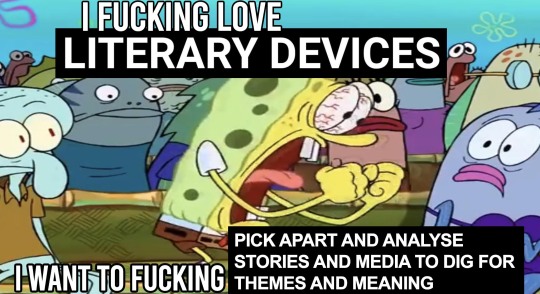
call me haydar! i'm a 20-something queer southeast asian who never shuts up about anything. i come on here to act crazy and leave. please don't take me too seriously.
as of late i've been obsessed with blue eye samurai and particularly mizu/taigen.
you can read my carrd for a list of my other interests and ships, if either of those things matter to you at all.
side blogs:
- @haydardotjpg (art blog)
- @mirrorsimaging (aesthetic/inspo blog)
- @salami--sato (a:tla blog)
- @aquakeymom (kh blog)
tags:
all my original posts - #shut up haydar
all my fandom-related posts - #fandom.rtf
my meta - #meta dissertations.pdf
my art - #drawings.jpg
my fics - #fanfic.docx
my misc writing - #scribblings.txt
my 2 cents on fandom discourse - #wank.mp3
my fandom shitposts - #shitpost.htm
my writing-related posts - #on writing.log
my OCs - #haydar's OCs
asks and answers - #letters.doc
my comments on reblogs - #peer review and addendums.pdf
all posts related to "a new ember" - #a new ember taimizu fic
✨ expert testimonials:
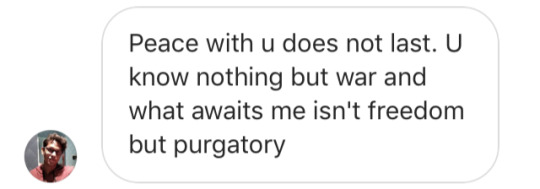


✨ fanfic comment hall of fame:









#last edited: 20 april 2024#updated to remove the server invite code. invites will now be given thru DM only!
14 notes
·
View notes